#or at least in their own perspective they are justified to act as they do
Explore tagged Tumblr posts
Text
Why doesn't Thingol just give the Silmaril to Fëanorians?
One thing I find curious about the discourse around the Silmarils and their ownership issues is how it seems to often simplify the Sindarin and especially Thingol's perspective. I mean, Thingol giving the Silmaril Beren and Lúthien stole from Morgoth's crown to the Fëanorians is framed as somehow easy and obvious option. But I don't think it really is?
It's not even about whether Thingol is right or wrong to act as he does, it's about why his actions are justified from his point of view (and why it is more believable than him being compliant to Noldor).
1. Noldor disrespected and antagonised Thingol from the start. They have given him little reason to be nice or helpful.
When the Noldor arrive in Beleriand, they immediately start to do their own thing, and disregard Thingol, the local sovereign who is regarded as the overlord or at least respected and revered by the Elves native to this region. But Noldor (and Fëanorians) do not attempt to gain his friendship and alliance, they don't establish diplomatic relationships, they bring no gifts (which would be expected in this kinda medieval based society) and neither do they ask for help as Exiles, they don't let Thingol know where they are going to settle down or ask whether it's convenient but grab lands whether the locals like it or not, they don't recognise his position even as a friendly gesture, they don't disclose the nature of their expedition, withhold important information, and most of all, they bring violent trouble to his backyard. This must seem deeply and outrageously insulting to Thingol, especially because these princes are children and grandchildren of Finwë, Thingol's close friend - and yet they treat him without an ounce of respect.
Thingol is no less proud or particular about his position than Fëanor or Fingolfin is. He probably has not had it challenged or ignored by anyone except Morgoth's servants. Also he may see it as indicative of general Noldor prejudice/disdain against Sindar.
Whether Noldor had justified reasons for the way they act upon landing in Middle-earth, you can't deny that they don't do even the bare minimum to win the locals over. Yeah, you could argue that bringing reinforcements at the time when Morgoth returns and becomes active in Middle-earth again is something, but this is still not a way to treat potential friends and allies.
2. The Kinslaying of Thingol's people and kin at Alqualondë and the burning of their ships.
Obvious, really. He may see himself as standing in for Olwë, and regards the Silmaril as weregild for slain relatives and friends - people he himself probably knew before Teleri were sundered. Also why would he respect Fëanorian property rights when from his point of view, Noldor don't give a damn about Teleri or their rights?
Thingol may also judge that the Kinslaying and burning of the ships disputes the Fëanorians' right to the Silmarils and their moral high ground to a degree where anyone brave and cunning enough to reclaim even one of them becomes a rightful owner. Obviously he is biased in Beren and Lúthien's behalf but it would be weird if he was not? After B&L's efforts and their suffering, and quite literally achieving the impossible, he may be of the opinion that they have more right to the Silmaril than Fëanorians who seem more invested in competing Morgoth for land than for the Silmarils. Thingol may share the same attitude as Dior has in one of the drafts: there are two more Silmarils in the same place where the one in his possession came from, so why don't the Fëanorians go get them first?
3. Celegorm and Curufin.
I mean, after the way Lúthien was abused and attacked by the two brothers, Thingol could be holding on to the Silmaril out of pure spite. His daughter never gets any apology for how she was treated, and Thingol has no reason to believe that C&C's actions - and the attempt to force Thingol into an alliance - were not sanctioned and approved by the rest of the brothers. These people have been consistently terrible at everyone Thingol loves and cares about, so why should he help them in any way?
4. The Silmarils mess with your brain.
It's clear that the Silmarils have an unwholesome effect on almost everyone who possess them. Time and again Tolkien describes how characters fall prey to this greedy, possessive lust for the Silmarils. I mean, Fëanor and his sons are ready to spill blood again and again just to get them back. There is something about the jewels that, if you desire them for their own sake, kind of enslaves you to them. Thingol won't give up the Silmaril to Fëanorians because he can't.
5. The Doom of the Noldor compels him.
It's explicitly stated in the Doom that while the Oath will drive the Fëanorians, it will never yield its objective, and the Silmarils will elude them. As soon as Thingol names a Silmaril as a bride price for Lúthien, he becomes involved in the Doom and what it dictates, limiting his control of the situation. Because of the Doom (and the effect the Silmaril has on him), Thingol is not free to give it to the Fëanorians.
#Elu Thingol#Thingol#The Silmarillion#Silmarillion#that character x/y/z withholds a Silmaril from the Fëanorians is probably more complex than them just being intentionally 'shitty'#or at least in their own perspective they are justified to act as they do#it can be fun to imagine scenarios when x/y/z acted in a different way than they do in canon#(and fanfiction is a handy way to explore those situations)#but as far as the canon (or the many drafts) go#Tolkien usually gives sufficient information to understand the choices made by his characters#and of course there's also this thing: the narrative compels it
30 notes
·
View notes
Text
Daisuke’s Death and the Invisible Abuse of “Privileged” Children
tw: extensive discussions of child emotional abuse
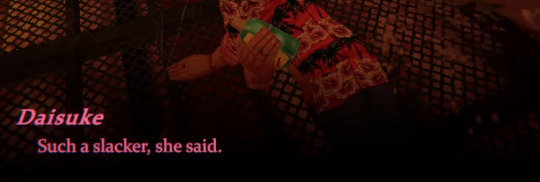
Another mouthwashing text analysis before I post any polished art? Shocker. But I really really appreciate the reception on my Swansea post, especially as a new account! This Daisuke-centric analysis is gonna be a quick one (< this was a lie. long read ahead!) but he is a character who resonates deeply personally with me as a victim of abuse that looked very much like his own. I do plan on doing a larger analysis of his character, but the abridged version necessary for this piece goes as follows:
Daisuke’s treatment in the narrative—both his implied home life and Jimmy’s taking advantage of him to go into the vent—is another one of this game’s excellent portrayals of normalized (and thus invisibilized) abuse. Children are often cited as one of the most vulnerable classes of people, if not the most vulnerable (I acknowledge that Daisuke is not a child, but Mouthwashing implies that this narrative of his inadequacy has persisted throughout his upbringing and, to this day, he is dictated tasks and lacks independence, treated like a dependent. His youth is also an undisputed feature of his character and, most importantly, the cast treats him like a kid). Children’s dependency on adults and our willingness as a society to accept that the adults in their lives provide the most objective perspective on these young people renders them particularly prone to abuse easily swept under the rug or “justified” by wardens who possess the power to dictate the narrative. Jimmy’s engagement with Daisuke is an extension of the latter’s vulnerability. The co-pilot’s assertion that “he’ll be fine (…) mommy and daddy have him covered” at the birthday party represents a deference to Daisuke’s parents as adequate caretakers who will ensure his longevity and comfort on the basis of their wealth. And we know that Daisuke’s parents think the same—the Q&As reveal that they believe they are doing the best to secure their son a good future. However, the same Q&As indicate that they don’t actually engage with or understand Daisuke’s interests and that their approach to parenting him is entirely understood through their personal beliefs, not those of their son. And Daisuke clearly carries that quite close to his heart. He seems to struggle with identity and acceptance, seeking validation in the form of praise. Daisuke is defined through what he can do for others and not what he independently brings to the table, because that has never mattered where he grew up. The consequences of his parents’ failure to meet his emotional needs ultimately conditioned Daisuke to be perfectly available to be taken advantage of in a corporate setting defined by capitalist attitudes and hierarchies.
While it’s not concrete to say that Daisuke grew up in an emotionally abusive household, it is most important that we cannot dismiss the possibility and that his behavior as the outcome of some obvious degree of neglect is well-aligned with this theory. Moreover, the young man who comes out of that household is easily targeted by Jimmy’s abusive tendencies as a direct result of what he internalizes growing up. Daisuke is apparently financially well-off (contextually we can’t be sure if Daisuke’s family is upper class, middle class, or somewhere in between), and with that comes privilege. Even the way he packs—multiple personalized outfits, entertainment devices, etc—reveal that he’s used to certain comforts and hasn’t yet acclimated to the harsh expectations of companies like the Pony Express. But, especially where young people are concerned, it is all too easy to allow this privilege to act as a curtain between abuse and the outside world. We can acknowledge the privilege and also recognize that it benefits his parents much more than it benefits him as a young person.
Emotional abuse is complex and extremely damaging and Daisuke *does* show symptoms of at least being constantly verbally accosted and emotionally neglected by his parents to the point of permanently warping his sense of self. It also generated his overreliance on authority figures to tell him how to keep himself safe in their world. His mother apparently insulted him to his face (“such a slacker, she said”, and being reprimanded for being too talkative [from the Daisuke teaser]), and a lot of his negative self talk (“total screw-up”, “fuck up”, etc) is reminiscent of how people define themselves by parroting what they are called after internalizing consistent externally-imposed definitions of their identity. While these are not surefire indicators of abuse and I am not willing to diagnose a situation as abusive purely predicated on these factors, the behaviors Daisuke exhibits as a result share many commonalities with those of victims of childhood abuse. In fact, just about every time Daisuke speaks about himself in Mouthwashing, he mentions his failures and his work. It’s not lost on me that the teaser for the whole character is him pondering his mother and how she might not recognize him if he isn’t noisy and obnoxious. He personally puts a lot of stock in their assessment of him as lazy and annoying, but nevertheless tries to accomplish learning through the internship. Furthermore, Daisuke takes on a lot of his mother’s pain, hoping she doesn’t blame herself for the negative things that happen to him (even though in the same scene he reveals that she’s the reason he’s on the stranded Tulpar at all), indicating that he has taken responsibility for the feelings of people in his life even when those people are not his to care for and even bear responsibility for his pain.
Now in young adulthood, Daisuke rarely seems to have any sense of self beyond his parents and his work aside from one-off quips about baseball and babes. It suggests that he has always had to prioritize his parents’ desires growing up to avoid being treated unfairly and even cruelly, stunting his self-discovery. In abusive situations, your understanding of safety and your pursuit thereof are radically impacted and we see this manifest in Daisuke’s continuing willingness to accept those in command as the pinnacle of safety over what one might consider logical, personal acts of self-preservation. He equates safety with obedience, and I contend that that equivalence suggests a lot about how his parents reprimanded deviance from their plans. And not to be that guy, but it is kind of outright cruel to dump your utterly inexperienced teenager-to-early-20-something on a 1 year, no contact, unsafe space voyage in a failing industry knowing that he doesn’t have the necessary skillset yet. That’s what his parents do when they aren’t satisfied with his progress, and it’s intense and disproportionate and alarming! Especially for the dependent! They toss him into the deep end of the corporate machine and insist he learns to swim in such an oppressive, stifling atmosphere. It’s no surprise that he drowns, especially when he himself can’t recognize this as an unrealistic expectation and tackles it with everything he’s got because his parents are theoretically always right about what he needs. I don’t think it’s a stretch to say that normalized emotional abuse from the home and how it maps onto a victim’s adult life is a topic Mouthwashing would endeavor to touch on, because visibilizing invisible abuses of power in heteropatriarchal capitalist schemes is arguably the central undertaking of the game.
I don’t think Daisuke has evil parents or anything, rather that what we accept as “good parenting” and “good mentorship” is often negligent with regard to emotional needs and can easily become a source of heavy trauma for the children and mentees if that emotional aspect is stretched too thin in the pursuit of success. Not all abuse is intentional, and the dev Q&As imply that Daisuke’s parents thought they were sincerely investing in his future. They cared, just not in the best way for his wellbeing. Because capitalism emphasizes the individualistic pursuit of success above all else, it’s no wonder that a parent would think that the best thing they can give their kid is an avenue to prosper financially. But in doing so, Daisuke’s parents deny him the opportunity to define himself, to experience agency, and to build up confidence. Effectively, they create a young man so vulnerable to abuse by higher-ups (a manifestation of abuse that is often intentional at the systemic level) that he decides to climb into that vent at Jimmy’s discretion under the pretense that he will make somebody proud. Because that’s how Daisuke has been raised to understand himself and his place—the presumed screw-up boy as a default, making you proud by doing the right thing, who has learned to pursue that achievement to avoid the condescension and disproportionate backlash (e.g. the internship itself) that comes with failure. Everything circles back to his parents’ expectations that he makes for a good worker. When the cocktail knocks Swansea out, Daisuke makes an offhand comment about getting a bad reference—even in the most dire of circumstances, he can’t stop thinking about their capitalistic expectations for his “good” future.
I find that Daisuke really is such a good subtle portrayal of how parents with resources can get away with emotionally stunting their children because we perceive their ability to put a roof over their heads, food on their plate, etc as adequate parenting and even a privilege for the child when it should be the bare minimum. Jimmy certainly buys into it, and even some of the fandom parrots that, really and truly believing Daisuke is some good-for-nothing kid who doesn’t try hard when all we see is him working, including climbing into the vents to try and help despite not being assigned the work (foam scene, not his death). I find this reception shows how inclined we are to accept those narratives of the privileged child’s inadequacy before we address the parent for not fulfilling a child’s emotional needs, which are just as important if not more than the material.
To wrap this up with a quick discussion of the symbolism of his death in the context of the emotional abuse of children (which is the reason I made this whole post but I can’t talk about this guy without going off): Daisuke getting so badly injured trying to do what’s right is a very physical manifestation of the suffering he was already going through. It is the pain of constantly people-pleasing and of holding it all in when he’s lashed out at. He gets injured at all in the pursuit of appeasing Jimmy and (theoretically) Swansea, both of whom he blindly trusts despite how they treat him because he has always been expected to just adhere to the adults with authority in his life. Being talked down to by them is not new and has never been a reason to question their judgement. Daisuke sees this as a product of his own inadequacy as implied by other people, and not of external cruelty. He was raised not to question the system for fear of repercussions.
Jimmy is perfectly situated to coerce him into a dangerous situation because Daisuke has never been taught to say no. The safest option for a scared child is to trust their mentors, and an adult Daisuke does just that. Even Swansea’s teachings of safety are dismantled by Jimmy’s tactical use of captainhood to break the camel’s back. Authority. Daisuke must always listen to authority. Jimmy knows the vent isn’t safe. Swansea tells him directly and he observes the foam incident (if from a distance). For as much as he acts like he cares about taking responsibility for Daisuke’s safety, his individualistic pursuit of “fixing” things manifests in Jimmy again taking advantage of a vulnerable person on the ship. Jimmy doesn’t reconcile Daisuke’s eagerness to help with lessons on safety like Swansea does, but rather uses it only when it benefits him. Daisuke is taught by his upbringing to accept this kind of treatment—for safety, defer to the leader in the room even if it hurts and you don’t want to do it (just like he didn’t want to be on the Tulpar in the first place).
Then, once the intern is out of the vent and mortally wounded, Jimmy applies the mouthwash (a product to be sold, hauled in the interest of the corporation) to “help” sanitize the wounds. But the sugar content negates medical utility and only worsens the pain. We can interpret this as the application of material privilege, “sweetness”, that wasn’t actually any help at all to solve the deep wounds left by emotional pains. Mouthwash rids you of the bad taste but doesn’t kill all the underlying germs. One could argue further that in this scene, the mouthwash is specifically representative of the Pony Express internship: a rare stepping stone in the corporate hustle gained through privilege and presented as a boon. Like the mouthwash, the internship is imposed on Daisuke to try and “help” him succeed and be better, but it only elevates the pain by irritating the wounds and ends in his agonizing demise. However, this fine-tuned comparison isn’t necessary to my point. I find the broad implications of the mouthwash as an antiseptic immensely representative of parents and caretakers who don’t seem abusive to the outside world but who are actually subversively hurting their children and ultimately conditioning them to be victimized by capitalist attitudes. Our deference to material comforts and corporate opportunities as indicators of wellness renders us blind to where caretakers fail to address the emotional needs of young people. At the end of the day, Daisuke is still killed by the values his parents have instilled in him. It’s always the “captain’s” (literal or figurative) orders that seal the deal and cut off any of his autonomous doubt or dictation (for example, his desire to listen to Swansea and not go in the vent). His parents’ symbolic and saccharine gestures mean very little in the scheme of creating a person who can survive the pressures of the “real world” when malicious actors (JIMMY.) and the capitalist enterprise as a whole bear down on the cracks of an emotionally taxing youth.

A/N: Maybe I’m thinking about all of this too hard, but the beauty of Mouthwashing is that I’m never quite sure that’s the case as this game feels so deliberate. Anyway, as somebody who has clinically diagnosed PTSD stemming from childhood, this has always been a really important analysis to posit and I finally found the time to put it into words. I feel like Daisuke as a symbol is often overlooked by the fandom. He’s enjoyed, yes, but not really broken down like the others are. That diminishing of his importance and his feelings about the situation also feels like a symptom of his age. But that’s neither here nor there—like I said, I believe I could do a much more in-depth analysis of Daisuke as a victim of subtle abuse but this will have to do for now. A lot of my major points have been made, anyway! Perhaps video format would be best for something longer-form. 🌺
#.txt 🌊#mouthwashing#mouthwashing analysis#daisuke mouthwashing#not tagging Jimmy but he’s mentioned here#mouthwashing game#oh my god this is so long I’m so sorry#I have an actual class essay to write but here’s daisuke mouthwashing I guess
502 notes
·
View notes
Text
Alien Stage R6 Analysis
VERY LONG compilation of my interpretations, impressions and unanswered questions about Round 6 of Alien Stage. I just wanted to write this to put all my thoughts in one place so I can finally rest (in pieces). TW for mentions of suic*de/suic*dal ideation.
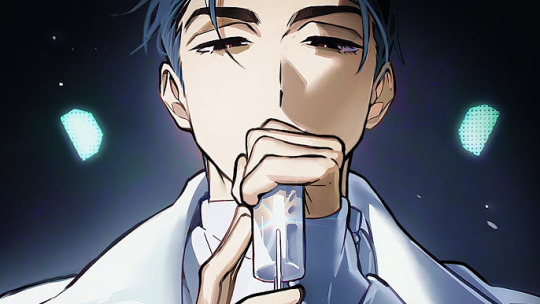
The most debated is no doubt the kiss/choking scene and Ivan’s motivation for doing so in the first place.
I think from the very beginning, even before R3, Ivan was planning to go out with a bang. That’s the immediate impression I got from the comic where he mocks/criticizes Sua for planning to “selfishly” die for Mizi and feel good being the “heroine” rather than having to deal with the trauma of being the one left behind.
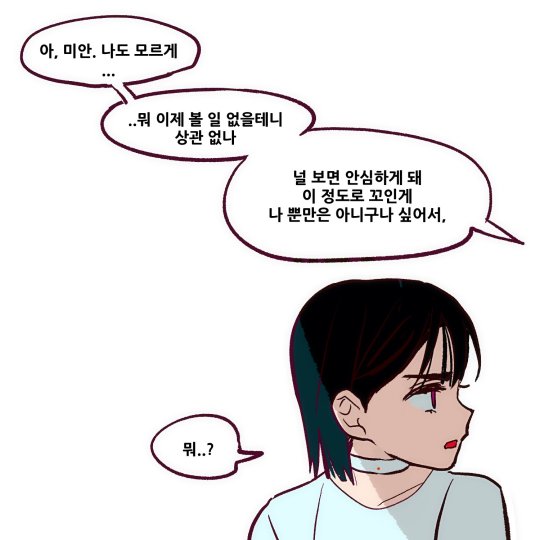
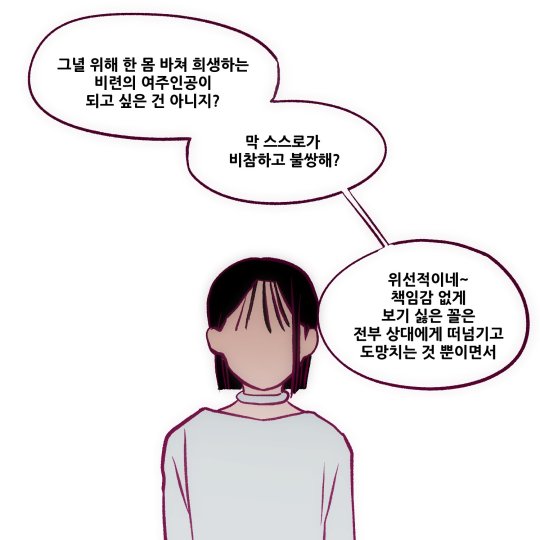
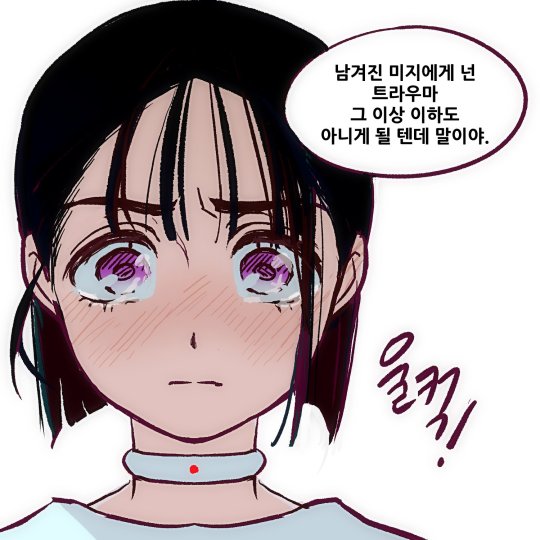
(I'm too lazy to edit the whole translation as of now, but might do so when I have more time.)
Ivan tells her how he’s “relieved that he’s not the only who’s that twisted” = He’s comparing himself to Sua. He thinks they’re both ‘twisted’ for planning to do the same thing, but from Ivan’s perspective, he at least isn’t fooling himself into thinking his motives are altruistic. He tasted the feeling of being ‘abandoned’, and he knows he doesn’t want to experience it twice.
He also probably thought that his death wouldn’t be as impactful on Till as Sua’s death on Mizi, and therefore his own selfishness is more justified in his mind. This most likely plays a role in how cold and biting his words are towards Sua –he’s jealous of that difference between them.
I hadn’t noticed this detail the first time I watched the video: Not only did Till look absolutely miserable and defeated from the get go, but he completely gave up and stopped singing at some point. If you look at the video, we can hear the audio that was supposed to be sung, but Till is quiet and still, and THIS is the moment Ivan chooses to act.
Although they do not show the votes at that particular moment, stopping mid song would have definitely taken a hit to Till’s score as it’s basically forfeiting –a huge contrast to his previous match where he didn’t even let his opponent utter a single line.
In response, Ivan doesn’t just walk towards him but throws his microphone to the ground, explicitly forfeiting as well in order to then pull a drastic move like it was foreshadowed in his interview.
The kiss itself imo was the less calculated/arguably unplanned part. He could have just choked Till from the start and it would have gotten him the same if not better results (since it was the act of violence against another contestant that ultimately lowered his score and got the counter to stop).
That kiss was authentic and for himself entirely, both as a last desperate attempt at conveying his feelings and a selfish way of leaving a strong impression on Till that he wouldn’t be able to forget (a hypocritical move going back to how he criticized Sua). In that sense, I don’t think Ivan was seriously trying to take Till down with him –although that’s up to interpretation. As I see it, that would contradict his actions up until that point.
Till was VERY CLEARLY suic*dal (once again, he gave up singing), and after the initial shock of Ivan squeezing his neck, this fiery, rebellious man who is KNOWN to fight tooth and nail, simply closed his eyes and relaxed his body, waiting for Ivan to end him without fighting at all.
The thing is, no matter how suic*dal one may be, the fighting response when being actually suffocated is automatic and completely involuntary. People mention there not being marks on Till’s neck but I think the most telling sign is him not going red, not squirming, not struggling or holding onto Ivan’s wrists (again, expected involuntary responses), his eyes not watering or having blurry vision while we see Ivan from his POV, not opening his mouth even a little to gasp for air and not coughing or gasping either when he was finally released.
Ivan definitely had him in a strong grip, might have even made him a bit lightheaded, but the reason why Till could look so relaxed in the first place is because he had given up and was waiting for Ivan to go ahead. If his closed eyes and limp posture were due to the choking itself, he would have fallen or stumbled when being let go, but we see that his eyes open as soon as he feels Ivan’s hands slipping away and he looks shocked instead.
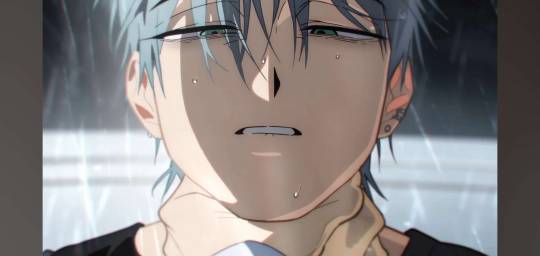
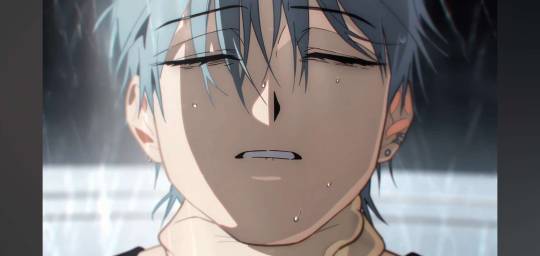
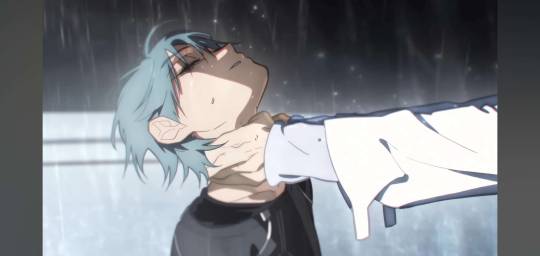
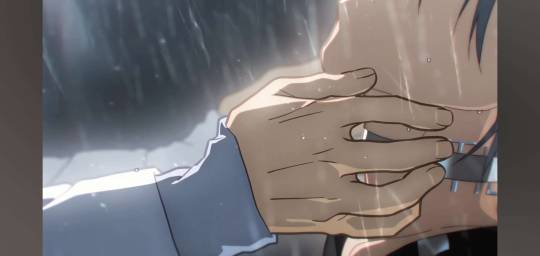
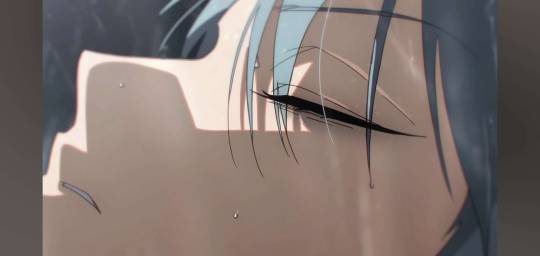
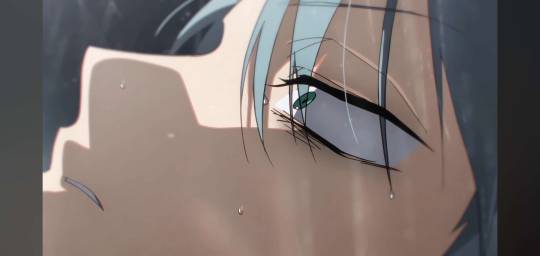
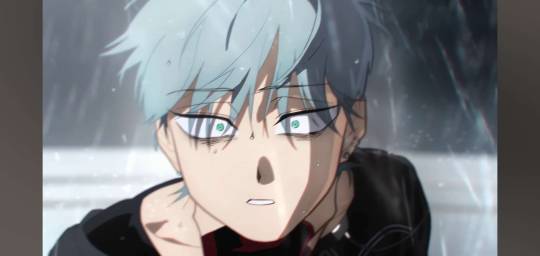
So then what was Ivan’s motivation, if not to kill him? Yes, there’s the already discussed plan to get himself disqualified. But Ivan glances at the screen only a few seconds after he starts the choking, confirming that the voting had in fact stopped with Till having the higher score. He then goes for one last ‘goodbye’ kiss before continuing to choke him, holding his grip even as he starts getting shot.
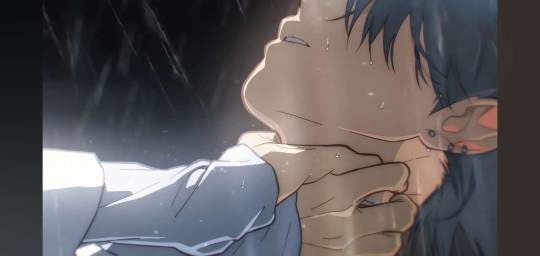
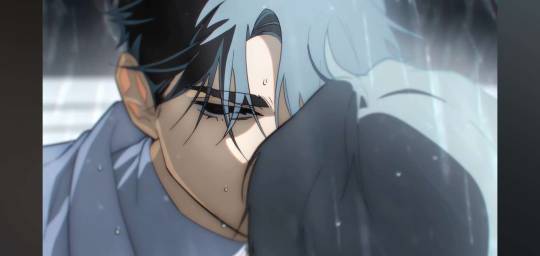
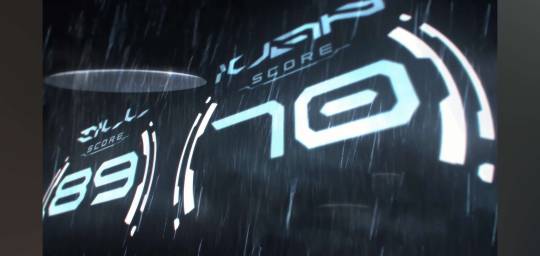
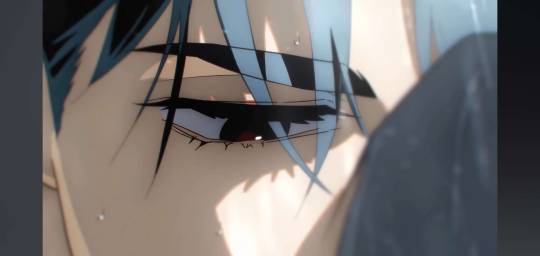
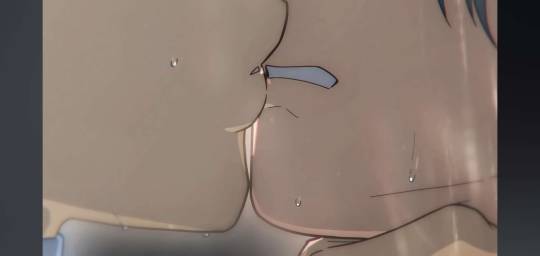
We see a closeup of him, his eyes and hands trembling, looking more frustrated/emotional than in Till’s first POV where he looks rather stoic. It makes me think that the reason he refused to let go was simply because he wanted Till to look at him.
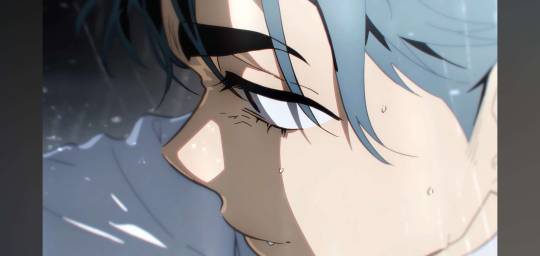
They strongly imply throughout the whole video that being annoying or mean or violent was the only way Ivan learnt how to make Till focus his full attention on him, but now even as he’s threatening his life, even as he himself is dying, even after that kiss, Till wouldn’t look.
It took him getting fatally wounded and realizing there was no turning back to reach a state of acceptance. His bittersweet expression here reminds me A LOT of his smile after Till runs back during the meteor scene, although this one seems a lot more tender. He seems to accept the fact that Till will never love him back, but Ivan cannot stop loving him anyways and he at least got to put his feelings out there.
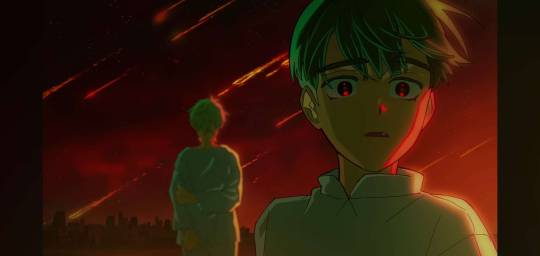
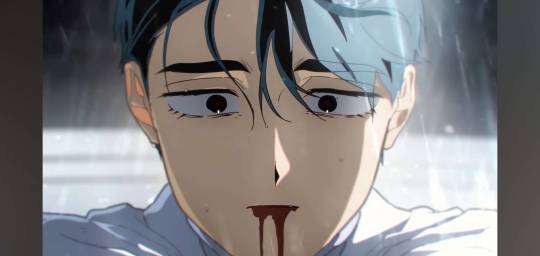
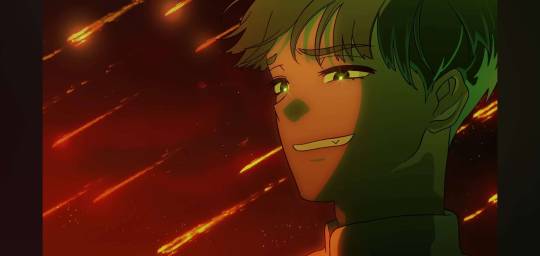
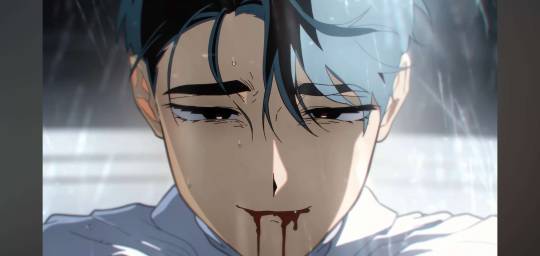
(The parallels here are driving me insane. The way there is light in his eyes in both instances as he looks at Till even while 'losing him' in a way. The struggle between wanting to posses him yet realizing his free spirit/strong will is part of what he loves about him. That last genuine gaze from a character who spent his whole life putting on a mask. Yes I am very normal about this.)
Until then, Ivan’s more tender/vulnerable side is only shown while Till is unconscious or looking away.
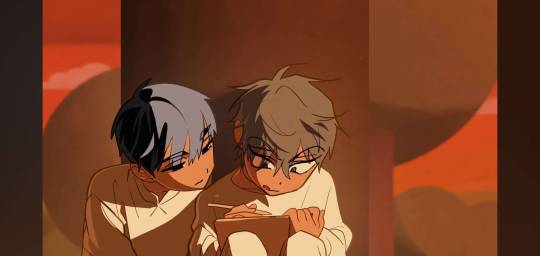
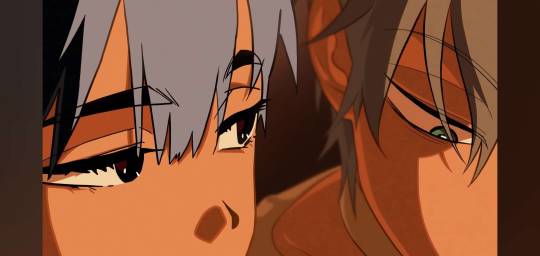
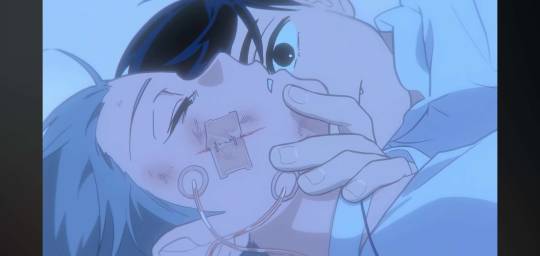
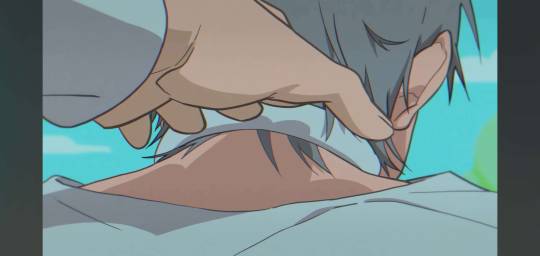
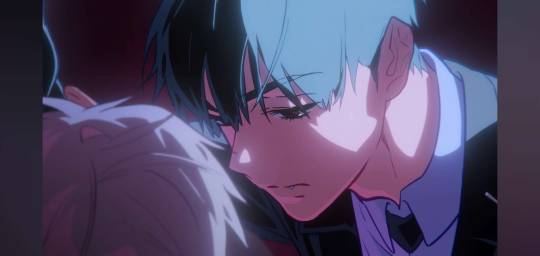
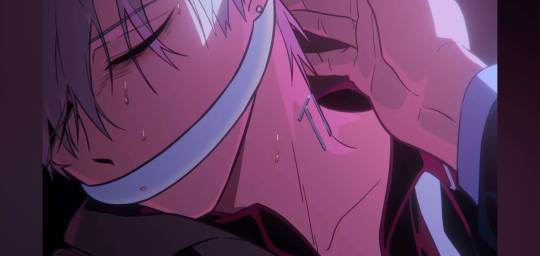
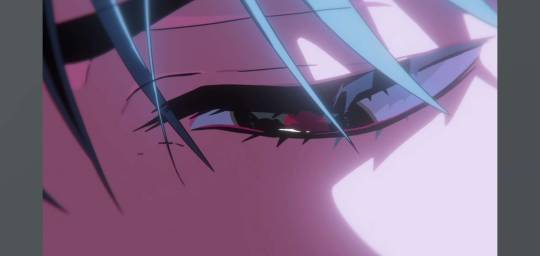
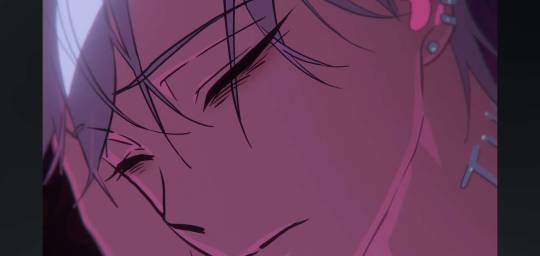
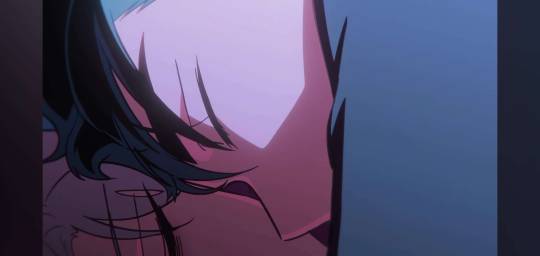
(That soft, loving nuzzle to Till's face has me in SHAMBLES.)
But ironically, it’s only when he releases him and shows him this vulnerability without a mask that Till really looks at him for the first time. I’d go as far as to say that it was this moment, and not the kiss, that finally made Till understand Ivan’s feelings. And in turn Ivan gets that little shot of euphoria as he falls to the ground.
Going back to the survivor’s guilt… I can only imagine it’ll go completely downhill for Till from now on. Not only does he already think Mizi might be dead and is angry at himself that he couldn’t save her (as seen in the shot where he punches his own picture), but now he has most likely realized that Ivan intentionally fumbled their match for his sake –which would lead to the realization that he was the reason why Ivan chose to run back to Anakt Garden after him in the first place, and that choice ultimately lead to his death.
Even though we see them fighting a lot as children through the videos and comics, it’s also implied that they were always together and they shared some quiet moments –the “Mizi didn’t play with you, I played with you” art, all that art of the main 4 playing together, those bright smiles as they ran away together during the meteor shower scene and Till looking so guilty when he let go of his hand.
There are a few cute doodles of them for those who are on Patreon, and some more lore in the Anakt Garden kit –so they were at the very least friends in their own way (as best as 2 very traumatized and abused children could), constantly fighting and making up. Which God… it shows that despite appearances Till must have actually had the patience of a saint when they were little lmao.
But what I’m trying to say is that despite what Ivan may have thought, his death will most definitely have an impact on Till and the narrative going forward, and I’m excited to find out how that reflects in the final round (if the resistance doesn’t manage to get back up in time to disrupt it).
Despite how much I adored (and SUFFERED WITH) this round, I still have MANY questions that were left unanswered, both about Ivan and Till, and the lore in general, and I wonder if there’ll be time to answer them all, as I can imagine the next MV will be focused on Luka’s perspective, the only one we haven’t been presented with.
One of the most pressing questions being: What’s the relationship between Ivan and that alien dog? Did he tame it? It is implied that it was Ivan who somehow led Till and Mizi to it in the first place in that one scene, and if so I wonder what his motivation was? Normally jealousy would be the first thing to come to mind but Ivan wasn’t interested in Till until AFTER he saw him stand up to the beast to protect Mizi, so it couldn’t have been that.
This is something that was also teased on Patreon and I was looking forward to the explanation on the MV, but it never came, and now Ivan is dead, so the next video will most likely not be too concerned with his backstory any longer. (Which, also, I was really curious about his life in the slums before being captured, auctioned and brought to Anakt, as that would have played a huge role in his twisted personality/dark tendencies –once again teased on Patreon very briefly, but not explained beyond that frame of him looking famished.)
The second is, how is Ivan able to open Till’s collar/muzzle so easily? This is a question I’ve been having since R3, but chalked it up to Ivan being sneaky and figuring out some kind of code to the cell door and that somehow automatically deactivating the locks on the restraints… or something. But with how many times he does it in R6 with just a touch it’s very clear that that isn’t the case and also imo they’re trying to point this out as a significant detail.
It may turn out that I’m just looking too much into it, but I find it really curious and interesting. Not only is he the only child without a collar (Mizi and Sua still had them despite being just as well behaved as him), but he seems to be the only one able to take them off –or at least Till’s. I’m pretty sure the children wouldn’t normally be able to remove them by themselves as it seems to be a control mechanism. So how can Ivan? This might explain a lot about how they were able to escape, and also add a layer of tragedy knowing that Ivan could have chosen to escape by himself at any point, but refused to leave Till behind.
Last but not least there’s all the human experimentation Till was subjected to, which was the main topic of the teaser and we see the same images show up in the very beginning of the MV. They help emphasize Till’s suffering and distressed state of mind, but then they’re never expanded on or mentioned at all for the rest of the video. That’s a huge piece of lore that I also hope isn’t forgotten.
I mean, I really doubt it will. So far VIVINOS & co. have been incredible with their ability to hold back information and release it at the moment where it’s the most impactful, which is refreshing to see. So I trust we’ll get some answers eventually.
Really curious to know why they would experiment on an ALNST contestant in the first place, especially one that is undoubtedly talented and described as a musical genius (aka. has good odds of doing well on stage and earning the segyein revenue). A very plausible theory might just be that he was just getting constantly drugged to make him less of a threat/more submissive –like we see on the karaoke room scene. But it might as well be something bigger.
As for my expectations for the next round… I’m still just trying to process this one, as you can see by the sheer amount of text. There are many things left to address, and the Hyuna/Luka confrontation has been strongly teased. I wonder also, if the round goes on without interruption, what would Luka’s strategy against Till be? Would he go for provocation again, trying to imitate Mizi/hint to his recent trauma with Ivan? It probably won’t be that simple.
I mean, VIVINOS has been known for subverting our expectations with each round:
The ominous/callous framing that was given to Ivan by the end of Black Sorrow and the art that followed, making us suspicious of his intentions, only to have him die for love. The lifeless/doll-like framing given to Luka, vulnerable and cornered by flashing lights, only to have him be the cruelest/most calculating one (that we know so far). The rebellious, rowdy, willing to do anything to survive framing given to Till, only to have his fighting spirit completely break and willingly waiting to die by Ivan’s hands. The naive, complacent and passive image given to Mizi, only to have her snap, beat the shit out of Luka and join the rebellion –and with how things are going (and her being the protagonist) I wouldn’t be surprised if she, and not Hyuna (the one who was framed as the most strong and reliable, giving us a false sense of security going into R6), is who will have to try and rescue Till (and Luka???).
There are still a ton of things that keep me awake at night about R6 –my favorite character dying aside. I could talk about it forever, but I’ll leave it here.
Feel free to share your theories, delusions, interpretations or any detail I might have missed with me. God knows we need group therapy after this as the cute chibi keychains can only heal us so far. Thanks for reading my rambles if you made it this far. :’)
#alien stage#alnst#에이스테#ivantill#vivinos#ivan alnst#till alnst#im GOING INSANE idk if you can tell... hahah#the only reason i didn't flood this with more videos and pictures is cause tumblr gave me a limit of 30 :')
525 notes
·
View notes
Note
This isn't a gotcha, so please don't take it as such, but would yuou be willing to explain what it is about VAL that makes her such a favourite of yours? I can't stand her myself, she comes across to me as a bully given god-like power that she abuses for her own amusement, and I've seen you acknowledge as much, but we draw completely different conclusions from that. I just want to understand your perspective.
i've been anticipating a question like this for a while now, so i'm more than happy to answer for you!
you're right, VAL is in some ways a "bully given godlike power" as you put it, and there's no avoiding that (nor do i want to). and yeah, i do like her in part because of that, because i have a fondness for horrible fictional characters and in particular "bad victim" archetypes, of which VAL certainly is one. but i think what makes her compelling to me, rather than repulsive, is that she is fundamentally a cautionary tale and a tragedy. in-universe, she's the scapegoat. the example. the "make the right choices or this could be you". she's inescapably, heartbreakingly human in her awfulness, and that makes her terrifying, but it also makes her deeply sad (at least to me).
i also strongly believe in rehabilitative/restorative justice, so for me, wanting better for VAL is about my real-world principles to a degree. i can't and won't argue that VAL doesn't function as an uncomfortable allusion to a lot of atrocious crimes against humanity (by humanity) within the narative, and that anyone who finds her upsetting or even hateful for these reasons is absolutely justified in doing so. however, she's still a fantasy entity at the end of the day. she's not a 1:1 stand-in for real-world abuses any more than, say, a vampire or werewolf, which plenty of people are more than happy to explore the nuances of. and there's also the question of what punitive measures would even achieve in her case, beyond personal satisfaction for the one administering or spectating them (which is not to say that wanting to punch VAL makes you as bad as she is, just that her arc is, among other things, about how cycles of abuse and violence perpetuate). the worst that could possibly happen to her has already happened. she's been tortured. she's been taken advantage of for her mistaken belief that working for and with the system has the opportunity to benefit her, and died for it. there's nothing to be "learned" from her punishment that hasn't already been shown to us. that she hasn't already internalised. if she were ever to develop a stable conscience, that would be punishment enough in my opinion.
despite being a victim of people not entirely unlike VAL, i personally am not her victim, so treating her with sympathy and kindness whilst acknowledging the elephant in the room that is her many (fictional) war crimes is not something that requires any cognitive dissonance on my behalf. i would cautiously argue that the narrative agrees with me somewhat in this regard - the few times VAL is treated to a genuine act of kindness with no ulterior motives, it shatters her composure and outward conviction that what she's doing is necessary for her personal satisfaction, and even prompts her to reconsider on occasion (sparing the woodsman comes to mind). i'm not saying anyone needs to hug her and tell her she's valid, but if all it takes is some genuine good intent to get her to engage in introspection, i'm willing to be the person to offer it.
#ummmmm yeah. i like her. thank you so much for the ask though! id been wanting to talk about this#VAL thesiltverses
183 notes
·
View notes
Note
Hello! Not a request, I just needed to get this Lilith related thought out, hope you guys don't mind! Alright, so in NB we learn Lilith believed demons, angels, etc. shouldn't interfere with humans, that she believed it to be arrogant. But then the whole catalyst for the war is because Lilith went and interfered with a human life, the life of her beloved. I thought about it, and I think I have a way for these to coexist! To put it bluntly, the angels trying to guide humans down certain paths is the angels robbing the humans of agency, but what Lilith did—or at least thought she was doing—was returning that agency to her beloved. Because the human fell ill, they were going to die from this illness, their choices have effectively been stolen from them. They were fated to die, and then Lilith returned their agency by saving their life. They're able to continue living, making their own choices, shaping their own destiny because their story is able to continue. Trying to guide humans down certain paths, convincing them to make certain decisions, manipulating them in a way, is arrogance in Lilith's eyes. Its robbing the humans of their agency, of their right to make their own choices, its forcefully shaping their lives which is something only that human should be allowed to do. But Lilith doesn't do this! I think, at least from Lilith's perspective, she not only didn't want to see her beloved one die but also she could have viewed this as returning their agency which was, in a way, stolen from them by their illness. Angels will shape a humans life as they see fit, arrogantly believing they know best, but Lilith was willing to face any consequences to return her loved ones agency to them.
Oh god we're so sorry, it's been so long since the post this was originally responding to but we're getting to it now!!
Agency is certainly an interesting point, and that could very well have been a way for Lilith to justify it to herself. It's true that humans are basically seen as the least powerful, and at least in terms of how Solomon describes it, the issue is that humans are looked down upon as not having the right to make their own choices.
Counter-point to Lilith, though: did she ask?
From what we know, Lilith had actually kept her true identity as an angel secret from her human lover. She stole the fruit from the Celestial Realm as an act of desperation to save him when he became deathly ill. And while it's true that this kind of death doesn't apply to demons and angels, that illness didn't come from them -- death is very much just part of human existence. So, to say that their choices were "stolen" isn't exactly accurate in that context, because it's not either side taking anything from him but simply humans' own natural limitations.
Lilith, as an angel who had never experienced that, couldn't bear the thought of his death and decided to take drastic action to save him. But stealing the fruit for him without telling him about herself, the Celestial Realm, the fruit, and the consequences? If he had no idea about any of that and she just gave it to him, which is what it seems like happened, that is actually her making the choice for him. She might have tried to justify it to herself, and it's not even to say she was "wrong" for it, but it's still hypocritical.
Plus, if the idea was that it would return agency to humans by not letting death take away their options -- why only him and not all of humanity?
Ultimately, humans do have some level of agency. While angels and demons try to influence and manipulate them, it's sort of the whole point that humans don't actually have to listen. Solomon's thing, and it seemed like maybe Lilith's as well, was that humans should not only have the ability to follow one or the other, but to freely forge their own path as well. The kind of freedom that Lilith and Solomon sought for humans isn't really about mortality vs immortality -- it's about respecting humans as equals capable of making their own choices. And if she indeed never asked and didn't allow her lover to make his own decision about the fruit, then it was hypocritical of her to interfere.
#and once again who knows if solmare even thought that contradiction through!!#since half the time they choose to just forget lilith existed lol#anyway now nb main story is over and they just never revisited the whole topic of humans getting agency between angels vs demons#thanks solmare#obey me#obey me!#obey me swd#obey me shall we date#omswd#obey me nightbringer#obey me nb#omnb#obey me lilith#ask and you shall receive#eventually....
69 notes
·
View notes
Text
Unreliable Narrator in the Sith Show
I have seen a few arguments that the Acolyte is a case of total unreliable narration, that it's a new Star Wars era of storytelling, a "sophisticated" show from the "Sith's POV," which is why the Stranger/Qimir seems so calm, balanced, and sure of himself. But don't worry - according to these opinions, the modern audience will be able to see through his lies, being astute enough to know that he's evil, without having to tell us directly. Because telling us directly is too much of a mustache-twirling villain trope, or something.
So is everyone on the same page? Did we all get this?
Naur, I don think so... because I have also seen a lot of odd defenses of the character, that he's not really as bad as the Jedi make him out to be, that he's not a Sith, and that he wants to be left alone as a rogue, without any allegiances, just doing whatever he wants, whenever he wants. I have seen people agree with his perspective, that the Jedi are the oppressors because they won't let him live how he wants. Someone even compared him to Mando with Osha as his Grogu. Man just wants a family without the government telling him how to live his lyfe. 😥
So if audiences are indeed smart enough to see through the unreliable narrator, why are they agreeing with him? Why are people sucked into his own perspective, which is Ayn Rand on steroids to my mind. Running through the galaxy, doing whatever you want? Okay, but look where that led. Once he wanted an acolyte to go out into the world and assassinate some Jedi, he isn't like Brendock or Dathomir witches anymore. That should have been a line, drawn, clear to the audience. But then the narrative goes back to extreme moral relativism. "Well, maybe the Jedi shouldn't have interfered..." or, "Maybe they were right to." So we have morally grey situations with a baddie POV mixed in, in a television show where we can't get inside people's heads? Okaaaay...Leysle with a Y. Good luck with that.
If this is all just unreliable narration, why is Sol so unsympathetic, unwilling to ask for forgiveness, even right up to the end? This just makes Osha look justified for killing him. The Dark Side doesn't even need to be "seductive" if Sol's actions were so bad. And I'm taking his actions that way because of what the showrunner said about him: Sol has a darkness in him that he can't control. And what was the content of this darkness, you might wonder? Well, he was being more like a "father" than a "Jedi" again according to Headland. Alright, why are those two roles mutually exclusive, at all? Doesn't her own mentor Feloni criticize Obi-Wan for not being enough of a father to Anakin?
But maybe the unreliable narration could come through with how the Order is portrayed in their scenes without Qimir. But nope, they're like the freaking police department in the Wire: cold, calculating, trying to cover things up. If it was an unreliable narrator, wouldn't we have a break in all of the bleakness that shows us, hey "Qimir is kinda wrong here." I don't think we do.
Beyond any of this, I don't trust this writer to write something as complex as a "Sith POV," or use unreliable narration effectively. I don't think she's experienced enough.
Not to mention, I don't think the showrunner gets the emotional turmoil of what its like to be a Dark Side user. They should be lost in their emotions, letting their emotions rule them, subject to constant turmoil, constant fear of losing what they have, and wanting more and more because of their greed. The unreliable narration should break at some point to show that, and it shouldn't be so subtle that it goes over people's heads. Moreover, a Jedi like Sol should be more sympathetic because they are at least struggling to suppress their inner Dark Side. Sol did nothing like what Anakin did. If he is truly acting like a overly-compassionate father, then he shouldn't refuse to ask for her forgiveness either. He shouldn't be dead in the mud, choked by his own daughter.
Goddamn this show is fucking bleak.
87 notes
·
View notes
Text
"Izzy Canyon dwellers just want to turn him into an innocent victim who did nothing wrong!"
Actually my problem is that, in hindsight, Izzy didn't do enough wrong to justify the common interpretation of his relationship with Ed. In my book, the first time in the series he legitimately crossed over to villainous antagonist territory - someone you actually loved to hate for it even if you understood his reasons - was when he set the British Navy on the Revenge. That way he not only betrayed his integrity as a pirate by consorting with the common enemy of all pirates, but risked Ed's life too - cause, like, come on, that "plan" to send CJ to convince Ed to leave Stede was so far-fetched it barely counts as a plan. I don't buy Izzy ever looking at CJ and going "yep that seems like a smart, responsible, trustworthy man I could rely on for a delicate mind games operation like this". It was an act of sheer desperation on Izzy's part, but he still chose to do it. IMO this was actually worse than what he said to Ed in S1 finale. Although of course that was very nasty, too.
But the thing is, we don't actually have any info on what their relationship used to be like before S1. We were only ever shown, not told - and both times from Izzy's perspective: the first time in S01E04 during his resignation rant, which was very heartfelt and I'm sure a lot of it was true, but it's still one-sided, and the second time during his deathbed speech, which was, again, one-sided and this time biased in another direction - instead of airing his pent-up grievanced Izzy was putting most of the blame on himself.
Other than this, the entirety of Ed and Izzy's pre-S1 relationship gets extrapolated from one single episode, S01E04. The narrative itself seems to want us to see it as a microcosm of their usual long-standing dynamic, at least on the surface. We see Ed being depressed and suicidal, trying to open up to Izzy about it, and Izzy shutting him down and making him act like Blackbeard again. Since it's already clear that Ed and Stede are the main characters, we're primed to see Ed as the victim here and Izzy being an annoying, insensitive nag.
Except the context of those interactions changes everything. The context being that they are literally about to be attacked by the Spanish - something Ed knowingly brought on them with his decisive power as captain - and Ed is deliberately withholding crucial information from his own first mate and the rest of the crew, making them all think they're going to die and he isn't doing anything about it. Izzy wasn't just being a boring buzzkill not being excited for Ed when he showed him that ship model. He was actively panicking and trying to do his job asking Ed for orders so they don't all get slaughtered.
So, yeah, those are some very exceptional circumstances that don't say anything about their typical day to day interactions go when they're not in immediate mortal peril due to lack of communication. Was this the first time Ed ever told him about not wanting to be Blackbeard anymore? Izzy didn't seem very surprised, so probably not, but we don't know, and if Ed had confided in him before, we don't know how Izzy reacted - but I'd like to point out that this time he didn't ridicule Ed in any way, he simply pointed out that they were about to die if Ed didn't do anything. Does Izzy usually indulge Ed in the stuff he finds fun when they're not about to be killed? Again, we don't know, but Izzy's playfulness during that first confrontation with Stede in S01E02, and his whittling and jokes in S2 showed that he wasn't always as grouchy and joyless as he's made out to be. We actually saw him smile when Ed got excited about Buttons, too. Pretty sure if Izzy always shut him down about things like that, Ed would have stopped trying to share it with him long ago.
And, finally, there's one piece of this puzzle that doesn't seem to fit in with the rest at all. The show both told us and implied that Izzy couldn't let Blackbeard go because his own identity was too tied up in it, and because he idolised the glory of violent pirate lifestyle. But if that's the case, then why did he have no problem with Ed wanting to retire? Izzy literally gave him an enthusiastic thumbs up on the whole "kill Stede and steal his identity so he could live the rest of his life as a rich aristocrat" plan. If Izzy only admired Ed as a pirate, and was so hell-bent on keeping the Blackbeard persona alive, why was he ok with Ed retiring? How does this square up with the idea that Izzy had been keeping Ed chained to piracy?
I'd honestly hoped we would get some flashbacks of the two of them in S2, and then S3 before that hope died too, because there's still so much we're missing.
118 notes
·
View notes
Text
Abuse seemed normal and justifiable to me, the entire time I was living in it as a kid. I didn't question it, the justifications and defenses would appear in my head before I would even start to get upset about it. 'They didn't mean that, they did it to make me stronger, to teach me how hard life is. They only did it out of anger, they wouldn't have done it if I didn't make them angry. It happened because I did x. They're my parents, they're doing what's best for me. I just don't understand yet because I'm not old enough but eventually I'll get why they're acting this way.'
It feels like that when you've never had a life away from abuse; it is the only normal way of life you've ever known, and implication that it might not be normal are too scary to explore, but also completely unbelievable. Because you would have to believe that you yourself are in a special situation where normal rules no longer apply. Rules like 'your parents love you and do everything for your own good', 'you need to listen to your parents, they know what they're talking about', and 'Your parents are just trying their best'. And you feel like you're nothing special, nothing that happens to you is special, nothing is out of the ordinary, you're feeling even less than normal, you feel like something is deeply wrong with you, rather than the situation you're in. Of course your parents are normal, and mean well, it's you who needs to get their shit together and stop being, whatever you are, it's unclear.
It can seem from an outside perspective, that a child would recognize at least some of the abuse for what it was, even if subjected to the rules of 'parents love you, they know best, you need to obey them', if the abuse is extreme, but no, they wouldn't. Looking back at my experience I was able to justify not only the physical violence, neglect, insults and humiliation, but even the constant, very detailed death threats that would constantly come out of the abusers. I listened to them describe to me how they would kill me, often implying they should have killed me already, and all I thought was 'they are just saying that, they're not actually going to kill me, they're saying it because they're angry, I shouldn't take this personally'. When I think about that now, I am appalled, you would think anyone subjected to constant detailed death threats would know for sure that this is wrong. But I was also hearing about how they 'sacrificed everything for me' and 'nobody else would ever love me like this', and how could I have known, as a kid, which one of these are lies, and which are the truth? I was heavily pressured to believe that they loved me. How would I have known that my parents had reasons to convince me that their murderous intentions were fake, but the love they had for me was real?
Without a clear reference to how parental love looks like, there's no way to tell. And if you ever do see a depiction of a loving family, your abusive family will be very quick to tell you that they're "doing it wrong", "spoiling that child", and "created a selfish brat". And how would you know that this isn't true? You don't yet know that they have reasons to lie to you. You've been told they're your parents and they only want the best for you, like all parents do. They just don't want you to grow up a selfish brat, so that's why they don't do all of the listening, hugging, caring, paying attention, conversing, and advocating for you. To make sure you're strong and responsible as a human being. It makes sense when you're a kid. When you're an adult, you understand that it never made any sense, that shaming good parents only served the purpose of making you feel like you're having a normal experience, and that your parents were right to abuse you, even superior for it.
It's possible to endure any amount of abuse and to be convinced that it's normal. I've talked to adults who've been sexually abused and trafficked by their parents and still believed the parents loved them. There's no limit to what you can convince a child is normal. Any abuse can be hidden by a guise of normalcy.
#child abuse#tw death threats#tw mentions of csa#tw mention of child trafficking#hiding abuse#justifying abuse#recognizing abuse#living in abuse#abusive childhood#traumatic childhood#not being able to recognize anything as a child#because no references and pressure to believe what you're told#can overrule anything you're experiencing
122 notes
·
View notes
Text
How Terrible of a Parent is Odalia?
TL:DR: If we ignore narrative bias, Odalia is at best a little bit of a helicopter parent and nothing else. Her being a bad person actually doesn't translate to her being a bad parent and we actually have very little evidence that she is actually even that controlling.
So I want to start with saying that this isn't about whether Odalia is or isn't a good person. She is not. The show is cartoonishly evil with her... But in weird ways for their goals. Her most evil acts actually have little to nothing to do with parenting. Letting the rest of the Isles die for the ascension of her family? Technically not the worst parenting move in the world from a purely literal perspective of trying to provide the best future for your kid. Trying to murder Luz? Well, she is the protege of the most wanted criminal in the entire Isles. I can't imagine why Odalia might not want her child associating with her. Weird concept, I know.
And that's actually something to keep in mind with what is seen as her biggest crimes: Kicking out Willow and getting Gus, Willow and Luz expelled. If we shift perspective a little... Odalia is just right. They are bad influences who are negatively impacting her daughter's ability to learn and better herself. Why would she want Amity to continue spending time with them?
Yes, this includes tiny Willow. The ONE thing we see of the two of them as friends is them SKIPPING CLASS and hiding from the instructor, only for Willow to fail, get them attacked by animals and then in trouble. I'm sorry but that doesn't sound like a good thing to me. Even just trolling around the market and pranking some people in your own free time is better, which is the worst thing we ever see Boscha do in this sort of regard. Sure, Boscha is a bully but not to an extreme level (King makes a fucking point of how tame she is) and doesn't get in the way of things like school or work for either herself or Amity. For what Odalia cares about, which is Amity improving herself to have a better shot at a good future, which is not a bad thing to want for your daughter, it's what Camila wants by sending Luz to Summer Camp, why would she condemn Boscha instead of the one playing Hookie?
Then we get the fact that Dana literally had a list of crimes stated out for why Luz was a menace since joining Hexside. If we shift the perspective to be that seeing the photo made Odalia go "Well, there's one bad influence, her grades are slipping and I did hear that something happened during Grom... I'm gonna look into this," rather than "I MUST CRUSH THESE PEOPLE WHO MAKE MY DAUGHTER SMILE!" then her actions seem pretty justifiable. I mean, before Luz even joined the school, her and Gus were skipping class and causing massive property damage. She was cheating on Willow's assignment and breaking in. The Grom one is bullshit but Luz is genuinely a menace. Not a Spider-Man, J. Jonah menace but genuinely causing problems and damage. And again: In active connection with the most wanted, WILD WITCH, in the ISLES. With that, Odalia almost looks like the only sane person here.
Now mind you, main character bias, the fact that we know Eda is barely a criminal, etc. like that but Odalia doesn't have any of that. By the rules of her society, you know like Camila had to act from Luz threatening to vandalize her school with fireworks and assaulting her principal with a wild snake, she has every right to think Luz is bad. To think Luz is the worst possible person for her daughter to spend time with. Sure, she smiles... Now... But what about when life catches up? Breaking the rules is fun after all but there are consequences, at least if you're not Luz.
But what about her general parenting style? She places crushingly harsh restrictions on Amity after all! Well... No?
Here are her demands: I want you to keep your grades up but if you help me, I will let you dropping to being a B student slide with no further punishments.
Please wear this necklace so I can talk to you when I need to, much like texting a cellphone would do.
Please aim for an Ivy League school because I believe you are good enough for that and I will give you the support to reach that height.
I would like your hair to be green.
I mean... These all sound... good? Now yes, pushed to the extreme they can be bad. If there is no leeway, like if Odalia forced Amity to spend every second studying, threatened to disown her if she didn't get into the EC and demanded 100s on every test then yeah, she'd genuinely be abusive but she's not. Amity appears to have PLENTY of free time where she is entirely unmonitored and allowed to do as she pleases. This isn't even just post Escaping Expulsion. She spends time just hanging out with Boscha after all. She's able to run out into the woods to angst about Grom coming up. She goes to the Knee to train but that's without any supervision besides the twins who are known troublemakers (pin that in the back of your head btw). Even the necklace isn't like full control over her. It never overrides her body or mind. It's literally just sending messages. That's nothing, especially for a fantasy mom? Oh my god could that necklace be way fucking worse. When forcing her to dye her hair green, but not entirely so Amity must have some amount of say as to the styling of it or else her front half star wouldn't be allowed to exist, is the worst thing she's actually doing with evidence to back it... That's pretty fucking tame. It's like telling your kid "No, you're not allowed to have giant chains on your pants because they make you look like a thug." Oh and on the disown element? Amity literally tries to sabotage her mother's company and attack her and Odalia's reaction is just to go "Yep, that Luz girl sure is a menace, with a literal bounty, but you're still my daughter." That is the patience of a god damned saint right there.
And hey, what about the twins? They're Odalia's kids too. They don't fear Odalia though. She is neither of theirs greatest fear. In fact, they'd rather be with her than alone, because being alone is at least Edric's greatest fear. If she's as monstrous as the fandom likes to say, that should not be the case. Also, they do skip classes like Willow made Amity. We know this because Amity literally states it in her diary with frustration that no one does anything about it. That implies she tried getting people to do it. So why didn't Odalia crack down on them? Do they do things for as deals to get away with their freedom like Amity helping with the Abomaton show? I mean, same episode we meet them, they show up because Odalia told them to bring Amity her lunch because she forgot about it. Odalia cares enough that she'll see her daughter forgot her food, doesn't have to ask Amity where she is but instead keeps enough of an ear on her daughter's life to know where she is, which avoids some amount of claims of neglect, and sends Edric and Emira to the library. This could be read as not wanting to bother with it but just as easily it could be "Sweet, an excuse to force my trouble making twins to go to the library where they might actually study for once if Amity forces them to." It could also be that because she runs everything about Blight Industries besides R&D, she was just too busy, which is not the greatest sin in the world despite what kid's movies will tell you.
So... Why is Odalia labeled the worst parent ever? Why is she made out to be as abusive as Belos, who will literally kill Hunter if he's displeased enough, when there's so little evidence for it? Because I wouldn't bother with this sort of blog if not for the claims the fandom likes to make. The exact same claims that led to my first ever TOH blog that was about the contradictions in how people talked about Odalia post S1 and literally every piece of evidence we had. Is she flawless? God no. But this is a show that criticizes Camila for being too oppressive as a parent.
MAYBE it's a little misguided on what parenting actually is and you should question how it portrays its parents. See you next tale.
======+++++======
Oh, small additional edit to expand briefly on Clouds on the Horizon: Her kids literally attempt terrorism and her response is to ground them. Just. Ground them. With one person keeping an eye on them. Sure a trained guard but they just tried to commit TERRORISM.
I have a public Discord for any and all who want to join!
I also have an Amazon page for all of my original works in various forms of character focused romances from cute, teenage romance to erotica series of my past. I have an Ao3 for my fanfiction projects as well if that catches your fancy instead. If you want to hang out with me, I stream from time to time and love to chat with chat.
A Twitter you can follow too
And a Kofi if you like what I do and want to help out with the fact that disability doesn’t pay much.
72 notes
·
View notes
Text
A Much Needed Overview
I’ve been brought to a point of feeling the need to discuss the abuse depicted in Bungou Stray Dogs. This isn’t the brightest topic to speak about and I understand why people are reluctant to speak in detail about something as serious as this. It’s not easy, so I’ll be the brave face today because I feel disappointed about the lack of deep discussion beyond the popular topic of “The Abuse Cycle”.
I’m happy that it’s at least brought up amongst everyone as something that exists, I’m happy that people feel as though it’s something to talk about, but I don’t think most understand how to act about it. It’s never as cut and dry as how it’s depicted in most other pieces of media or how people speak about it in general. That is why I am thankful for its depiction here. Not saying that nobody speaks about it with clarity, but it’s not the majority, unfortunately.
I especially felt this was a good time to address this because of the reaction towards Asagiri’s thoughts on Dazai and Akutagawa’s relationship in the recent magazine interview. The outrage is not from nowhere, I was also taken aback at first, but to claim Asagiri “doesn’t even know his own story” is incredibly self-entitled considering the story isn’t done, nor are you the one writing this. If you read the story, no way is Asagiri justifying anything that happened. Please look at the question that is being asked, does it say “Do you think what Dazai did is morally right?” Of course, it isn’t.
Not to be rude but before you start questioning the writer himself if he’s read his own story, have you read it? Please keep in mind the fact this is only a magazine interview and doesn't reflect every nuance. Asagiri doesn't need to go “Oh yeah, this thing that’s bad is bad” every two seconds to explain himself. Asagiri’s writing decisions can be questionable and cannot be uncritiqued, but I’m going to have to defend him on this account.
I’m not sure if any warnings are needed concerning the subject matter considering most BSD fans know what I’m about to go over, but to be clear, please only read this when you’re in a well enough headspace for heavy matters such as this. I am not going to be talking lightly in any of this or dance around what’s happened between any of the characters, abuse is harder to talk about compared to other acts of violence that are objectively worse because it’s a more personal act that too many can find themselves in.
Finally, I do not want to speak about my own experiences online because I’ve only come to terms recently with it and they do not reflect everyone’s response to depictions of abuse in all media. Some things are very uncomfortable to admit about me that I haven’t told anyone, that no one would be able to take well even if they were my closest friend. This isn’t about me at all and there is no point in saying more about my reality, but I think my perspective might help people enlighten themselves on how truly complicated situations like this are.
What is Abuse?
Surprise, we need to go over this before any discussion about BSD happens because a lot misunderstand what abuse is. It's disheartening that the term has been so simplified that nobody knows what it means anymore. Don't substitute words for abuse or use abuse as a substitute for other terms. Abuse as a concept is quite hard to pin down with words and there are many ways to describe it, but by definition in the context that it’s directed to another person, abuse is:
To target and mistreat someone, causing them harm or distress in a repetitive manner
This by itself does not describe the grand scope of everything and probably might make you more confused, but it’s a great place to start and does describe what is directed to the victim. Many sources will use varied wording, but it’s the general knowledge that someone is being hurt to a fundamental level that makes it abuse.
Does the abuser need to intentionally hurt someone for it to be abused? Yes, but not in the way you think. Most abusers are not hurting their victims for the sake of just hurting them, that’s illogical, they’re doing it for something. Some examples include either for themselves in some way or what they think is for their victim’s “own benefit”. Even worse is when they genuinely believe it because they’ve also grown up in an environment that has that same mentality and reflects on themselves.
So yes, it’s intentional in that they’re doing it for a purpose. No matter their intention though, “selfless” or not, it’s still a selfish act in itself that they think that imposing their own will through harmful methods is what the victim needs. The abuse doesn’t need to be physically harming another for it to be abuse. As long as it’s harming you emotionally or otherwise and making you raise flags in your head, it’s abuse.
It sounds strange, but I'm saying it’s intentional because you’re still an intended target of their abuse whether they realize it themself or not. Abuse needs to repeat a form of distress in you to be abuse. For example, does one instance of physical violence against you count as abuse when it never happens again? Well, you need to think about the context. Usually, this would just be assault and that’s it, but is it left hanging in the air to happen again when you interact with them? Do you feel afraid for your well-being, even though it doesn’t happen again?
That’s still abuse, the psychological kind. Typically when abusers resort to physical means, it’s gonna happen again eventually. In this hypothetical instance, however, the point is that repeated distress does not mean repeated actions. It does not need to happen the same way for you to feel unsafe, it just needs to have power over you. Manipulation does not always equal abuse either. It’s a tactic used by abusers, but unless paired up with other actions, it doesn’t fit the criteria of abuse. Context matters when you examine what abuse is.
Here comes the tricky parts that are acknowledged less: When the abuser is someone you’ve relied on in your childhood, in a detrimental part of your life, or someone you care about that you put importance in, and it makes it hard to fully hate that person. What the abuser has done to the victim does not entirely reflect them as people, even if it’s still an important part of them that needs to be addressed.
Abusive people are not only defined by their awful actions, they’re not pure monsters like most love to pretend they are. It’s just easier to think that because accepting that they’re just a multifaceted human being hurts too much when you’re on the receiving end of their worse behavior. But what happens when you’re on the receiving end of both? You try to justify it the way the abuser is because you can’t accept that what’s happening is bad and not something everyone goes through. After all, they treat you decent enough sometimes.
Something so many people need to get into their heads already is that abusers can be victims and vice versa, but just because your abuser went through something themselves or is important to you, doesn’t mean you have to forgive them. Abuse is not forgivable just like that, you can rebuild a relationship beyond that if you’re able to, It’s not a “forgive-and-forget” thing.
Not everyone experiences and responds to abuse the same way, some hate their abusers fully, some can’t bring themselves to, and some don’t even know what to think, but there are so many who don’t feel one way that regarding all abusers as heartless monsters completely invalidates so many stories and their difficult experiences. I have a huge grudge against people like this who restrict abusive situations to just looking like one thing, this is why so many don’t even know that their situations are abusive.
Portrait of a Father
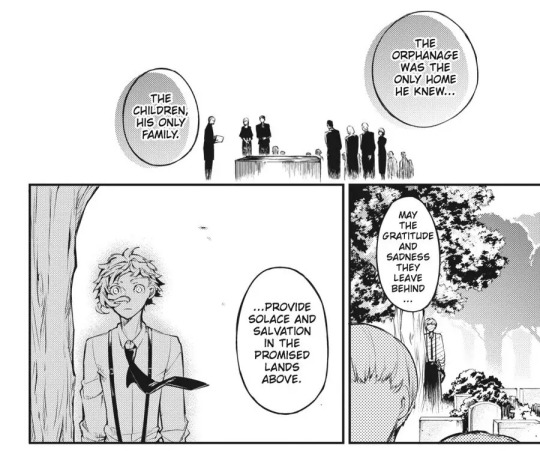
Chapter 39 reflects my points the most, and at the same time, it also turns out to be one of the most controversial chapters. It surprised me that it is, but maybe I shouldn’t be considering how most people on the internet act about abuse. It’s a lovely chapter to me personally and one of my favorites.
If you need a refresher, this is the chapter the Orphanage Director died in and leaves Atsushi in an emotional frenzy about what to think and believe. I know that the underlying message of this chapter is confusing to some, but it hit me in the face point blank on how this is about facing your abuser’s death without any personal conclusion with them.
Being sent on an investigation, Atsushi, after finding out the body was the Director, is stunned and scared because he knows nothing of the director other than his cruelty. He immediately assumes the worst and that he was coming after him again. Atsushi’s thoughts against him are entirely… on purpose in the director’s intentions because we find out that he has gone through so much violence and loss himself that he’s projecting his own will onto Atsushi and making sure he’d “survive in the real world”. So he became his first figure of hate and violence earlier in his life so he’d be “prepared for what comes next”.
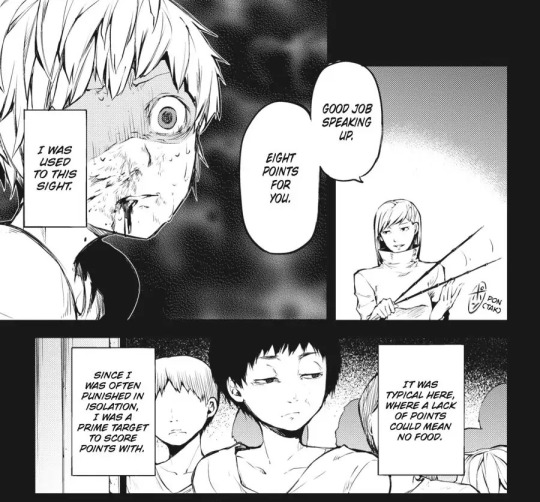
I know so many take the backstory for the director as a way to justify what he did to Atsushi in the narrative, but it was just to put into context why he was so cruel. Abusers are never cruel for no reason, that never makes it right, but it’s reality. Atsushi was not the only one in the orphanage who was treated badly, he was singled out by the director most likely for an ability he couldn't control because the headmaster knew he’d get the most trouble for it, and unfortunately… he was right.
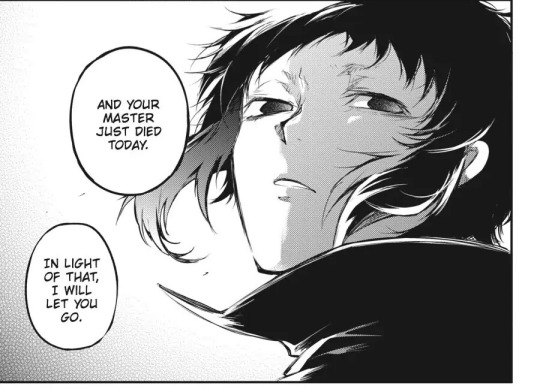
Akutagawa being his informant in this chapter makes perfect sense. He can see that what the director was for Atsushi is what Dazai is for him. No matter how terrible their actions were, it’s what kept them alive for so long. It’s not pleasant to confront, is it? Atsushi agrees because when he gets the information that the Director was going to congratulate him with the flowers he was going to buy by selling the gun he had on him, he freaks out. No way the guy he was raised so long to hate, the guy who put him through so much suffering, was going to congratulate him.
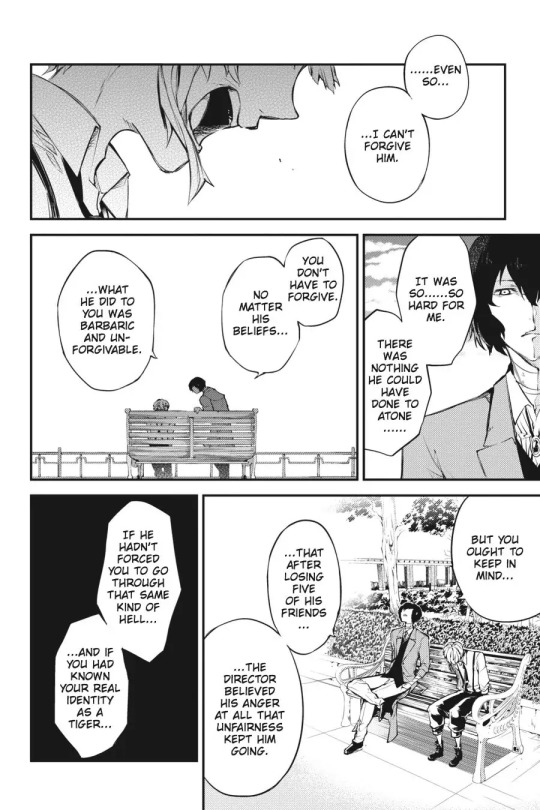
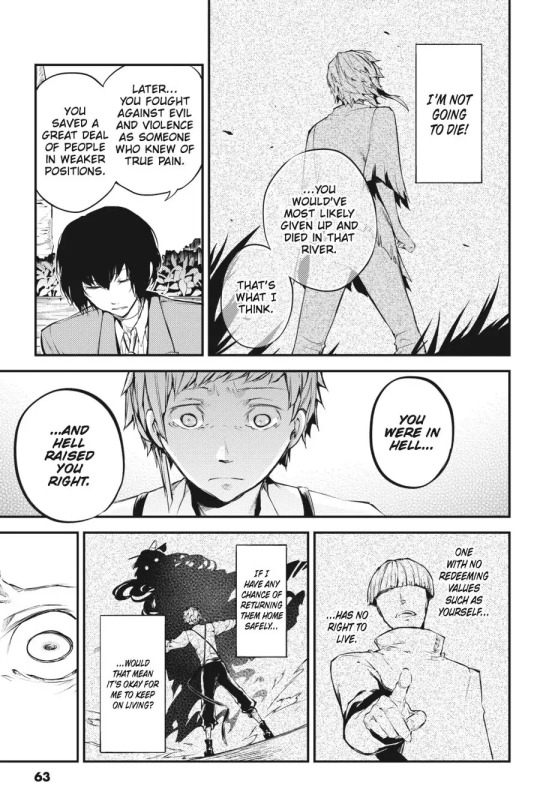
I know to some, Dazai’s talk with Atsushi sounded like he was justifying what happened because “it made him a good person in the end”, but that’s not what’s being said. This conclusion I’ve seen some people come to about this conversation confuses me. Dazai is just saying the obvious, you guys get all shocked and it weirds me out how easily it’s been glossed over that the reason Atsushi is so self-sacrificial and trying to do the good thing is because of the director. The reason he puts himself so much on the front lines is because he needs that worth in being good to live and prove the director wrong, he was raised to see that type of person is the most ideal person to live in this world.
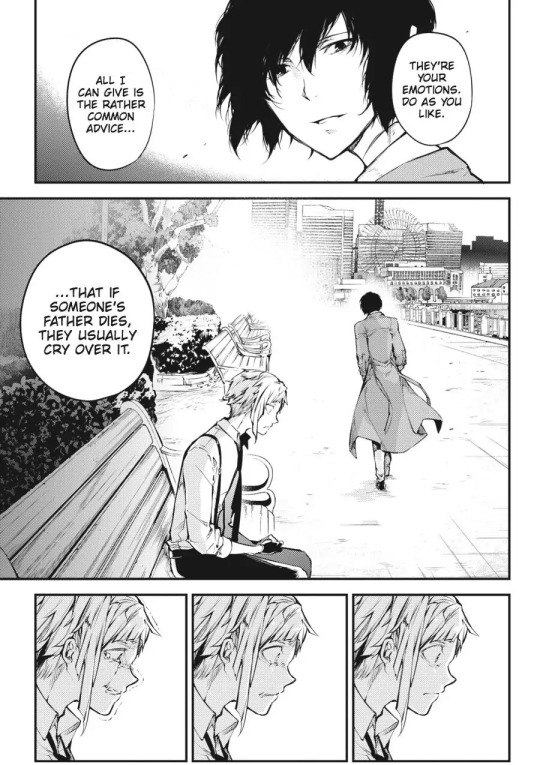
After everything that’s been dumped onto him in such a short time, so much inner conflict of what to think of a dead man he no longer can have any personal closure with, he asks Dazai what face he should make, what he should think at this moment. Dazai tells him that they’re his emotions and he can think however he’d like, but commonly someone cries when their father dies. So he cries, because ultimately no matter his treatment, no matter the intent and its effects, it’s still the man who raised him. It’s flawed, but that’s what a father is stripped bare at its core definition and that won’t change no matter your feelings.
Now that I’m done summarizing this chapter and making sure you guys understood the point and how it spells out their relationship, I can finally talk freely about what was happening between them. When it comes to familial abuse, generational trauma is so prevalent it’s hard not to talk about. The director is quite reflective of so many parents who were raised to grow up too early in harsh environments, that they think they need to prepare their children for it too, even though it’s no longer needed.
You don’t need to like someone for them to be important to you, especially if it’s a parent in your life or someone close to that. That’s why Atsushi cries. He cries for the director, he cries for himself, he cries that it’s finally over, he cries for the kindness he could’ve gotten even if it wouldn’t have fixed anything, he cries for the father that never was, he cries because his father is dead. It’s perfectly normal to keep someone close in your heart that wasn’t perfect and to grieve their death.
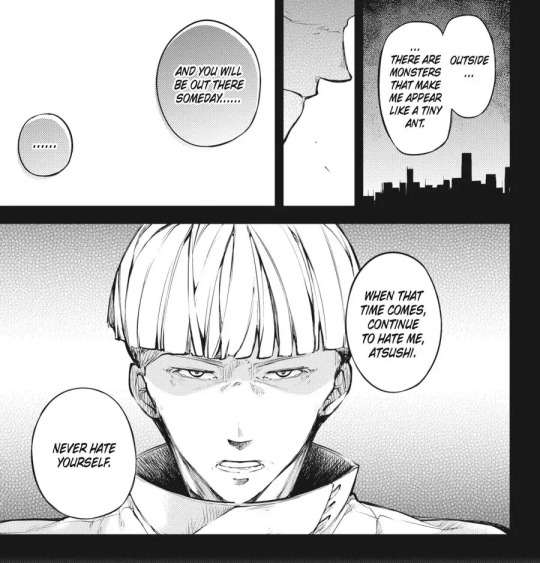
Was the director successful in what he was aiming for? I want to say no, but he did. He succeeded in making Atsushi think of others in a good light and do good for them, making Atsushi resent him, and giving him the ability to keep going. Hell raised him right, but it was still hell. The problem is that his teachings were based on degrading Atsushi into being nothing but a life he should put aside in favor of others. Even if he continued hating the director like he wanted, he would still degrade himself for being a coward who didn’t hold himself to those standards. The result is not perfect because the director is not perfect, but in his position, this is a success.
The director for a while was his shadow of negative encouragement when he joined the agency, what kept him going in those moments, because he was what defined good, bad, and justice for him in his entire childhood. Even if he was dead, he’d still linger in his mind. I can’t parse out what to think about these hallucinations forming Akutagawa and Dazai to guide him later on, all it tells me is that he still can’t rely on or trust himself and he needs more development in his self-image issues.
I see why fans are confused, hell raising us right is a bizarre thing to say to a victim, so let me show you a perspective you're not seeing. Let's imagine you have an abusive mother who only wants you to be prepared for the things you're undoubtedly going to experience because of what you can't control. What she did does help you, but all that goes through your head is “Why couldn't she have done it differently without my own suffering?” The only thoughts that come rushing back when you think of those memories are the unnecessary pains. It takes a lot for a victim to acknowledge this on their own, they want to push back at the past so they don't have to see this plain reality.
Like anyone else that I’m going to bring up in this post, just because the abuse made them who they are or affected who they became, even when it keeps us going through life and benefits us in some way, does not make the abuse justified. Abuse is still abuse, I addressed this already and I hope not to address this again. I needed to detail an explanation because it’s quite easy to hate a man you know nothing about and has been painted in nothing but a bad light. The anger against the director is undebatable because abuse is not debatable, but to pretend the cruelty was nothing but for cruelty’s sake is mischaracterizing both him and Atsushi.
You can’t pick and choose what’s been told to you in the text just because you don’t like a character and lack the maturity for it. It gets quite hard to do that sort of thing when it’s a character you‘ve grown to care about, it’s no wonder Dazai is divided between so many. Speaking of Dazai, his involvement in this makes as much sense as Akutagawa’s. He’s currently in a mentor position for Atsushi, no matter what Akutagawa says, and shows interest in his development. So of course he’s going to purposely stick his head into something that would affect Atsushi greatly. Both Akutagawa and Dazai are viewing this through their lenses as people who grew up in the darkness of society, and it’s not that Dazai thinks what happened to him wasn’t terrible, you should have eyes to read the panels provided, but he’s generally unfazed and able to sound neutral because he’s used to that cruelty.
The Port Mafia’s Environment
(Aka: is it really “all Mori’s fault” or is it just the product of being literally in The Mafia™?)
I’ll go over the “Cycle of Abuse” in a second, but please keep in mind that you can’t just blame everything on Mori. Just like the Director, it’s so easy to pin the guy who’s just been the worst for every problem there, but it decimates the other characters involved as well and makes what they’ve gone through go flat because you’re restricting it to a misinformed presumption.
To make a bold statement, I need you to completely throw away your idea of what the abuse cycle is. The Mori to Kyouka pipeline being the singular “Abuse Cycle”? Garbage, needs to go away too. I've seen many fans use the term “Cycle of Abuse” too carelessly, and while from afar the way they're using it is not technically wrong, they have the wrong thought process behind it.
The Cycle of Abuse is simply the patterns of what keeps us in an abusive dynamic and negative mental state, either with an individual or environment, and makes it incredibly hard for anyone to leave. It’s not the actions you take that make it the Cycle of Abuse, and it's not just one straight line of people going through similar motions. You don’t have to be someone’s abuser to be the one who keeps them there, if you feed into it you’re still a problem. Even if you don't actively add to it yourself, just staying there as a bystander and not trying to do anything to change it or speak up for the victim when you clearly could also still make you responsible. Just with your presence, it validates what they've gone through as normal.
If you need more of an explanation, two opposite examples include Higuchi & Akutagawa and Beast Kyouka & Atsushi. Higuchi is a traditional example in that she stays in the mafia because of her relationship with Akutagawa, and stays by his side for reasons unknown. What we do know is that she’s incredibly indebted to him enough to care for him to an extreme extent, but their relationship is abusive all the same. Beast Atsushi and Kyouka sounds strange for me to bring up, but this is an example of a non-abusive person contributing to the Cycle of Abuse. Instead of taking her out of an abusive situation, he brings her back in.
Many characters are a part of this main narrative of abuse in BSD, so it's not inaccurate to say Mori, Dazai, Akutagawa, and Kyouka are a part of it as well using this definition as all of them are the reason or contributed to why someone was stuck in a negative, abusive situation or the victim themselves. I’m guessing none of you are genuinely referring to this though and are referring to intergenerational abuse, a repeating cycle of younger generations taking after their abusers when they're older, which is a completely different phenomenon. Both are referred to as cycles and have many commonalities, but it’s not the same. Not to sound like a total dick, but this barely even applies to them.
Not because the concept is based on familial relationships, it can happen with older figures in your life too, but because our oh-so-famous Abuse Cycle gang does not have that commonality to make that claim. They have narrative parallels, but that’s pretty much it. I will save what I have to say in their sections, but Mori and Akutagawa did not abuse Dazai and Kyouka respectively for this type of claim to have any legitimacy. Kyouka certainly broke a cycle, but not that kind since that would need her to continue it in the first place and then prevent her own experiences from even affecting the next child.
What do all Mori, Dazai, Akutagawa, and Kyouka actually have in common? They are/were in the mafia, using their natural talents of cruelty for the underworld.
The Port Mafia resembles something of an abusive household or community that sees so much of what’s done to others there as normal, and constantly compares it to how it was with their old boss and thinks, “At least it wasn’t as bad as that.” It’s quite like the Orphanage Director’s thinking but on a larger scale. Does that make everyone in the Port Mafia abused? Nope, unlike most abusive communities, the Port Mafia is quite literally the mafia. Everyone is there for different reasons, at different ages, and different experiences. Everyone is taken advantage of in these situations, no matter the circumstances, but it doesn’t make them abused automatically.
So it’s hard to have a stance on anything about them being abusive other than the mentor situations in the Port Mafia don’t see abuse as abuse and just another way to teach their subordinates to survive in their world if they deem it necessary. Was Chuuya abused, either by Mori or Kouyou then? I’m going to have to say I can’t tell you that. We don’t have enough information on either of his dynamics with them to say that they’ve directly had any repetitive behaviors of direct harm against him specifically, and there's no reason for them to do so either. I’m not going to use the argument that “Chuuya doesn’t hate or fear them, so that must mean he wasn’t” because again, that type of response does not reflect so many situations.
Chuuya was still harmed by being in the Port Mafia as a teenager because nobody should have been surrounded by this much cruelty at that age. It doesn’t matter if he shows visible distress or not about the Port Mafia, he was just desensitized to it since his sheep days. So was he an abuse victim under the idea that being a child in the Port Mafia is abuse? That depends on who we’re speaking of, but in Chuuya’s situation, I'm going to have to say no as he's already internalized their mindset from his own experiences separate from the mafia. Keep in mind that it also still holds true that you can find family in situations like this, it’s not mutually exclusive. Some just find more comfort in what they’re used to than what would be better for them. Kyouka is a better example of someone being a victim of an abusive community.
A false claim I've seen made many times are the ones where they have it as if Mori is the mafia itself or that he made the mafia what it was. It shouldn’t be too surprising, but it’s the opposite. Mori already held flawed, heartless, calculative methods when in situations he thought required them. We’ve seen him as a soldier and an underground doctor, but we know nothing else about him outside of his cruelty, just like the headmaster. What he does is never for what he thinks is for his benefit, but for the sake of something larger. Whether it’s for the city, the country, or eventually, the Port Mafia.
The mafia is the first time he’s been put into a position of absolute leadership and is not yet accustomed to that at the beginning of Dazai, Chuuya, Age Fifteen. He’s able to quickly fit the mold of a mafia boss, but there’s that bit of honesty that peaks through in this light novel in the first and last sections that’s ignored too quickly. First Mori complains about nothing going immediately right, questions himself about Dazai, and becomes genuinely stressed if it was the right decision to involve him, then confesses that he sees himself in Dazai to him (and him and Fukuzawa in Soukoku in private), and finally gives his honest take of leadership to Chuuya.
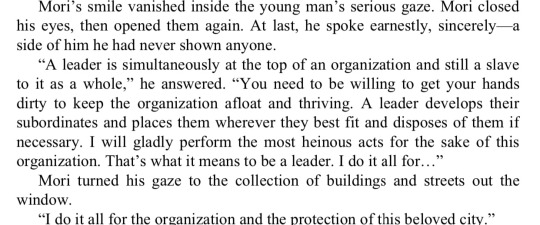
I already go over Mori as a character in one of my other posts and will speak more of him later on, so I don’t want to reiterate the same points, but here we have proof he has (albeit poor) humanity. He did not become the Port Mafia boss for his own selfish gain of power if you’ve forgotten, but because Natsume introduced him to becoming part of the Tripartite Framework to protect the city he loves, it’s where he’d excel best in this plan. The Port Mafia was already a shithole, Mori just made it livable again by becoming what an organized crime group needs.
It’s what makes the dynamic between Kouyou and him so intriguing because you have an abuse victim who has embraced the environment she was forced back into, but won’t let go of someone who’s proven to be more of a decent leader than her tormentor and can be relied on. For victims who couldn’t get help or realize they needed help, the easier path is to accept this is your life through some justification. While I said the Port Mafia resembles an abusive community, communities as such aren’t purely terrible and that’s what keeps them justifying it in their head. The family you have for yourself, whether it's a made one or the one you're born with, is what sticks for you.
Like it or not, Mori isn’t stupid. He takes risky gambles that backfire on him sometimes, but he’s good at his job. He’s brutal enough to prove his own against the people who didn’t think he should’ve been boss and outsiders who want to go against the Port Mafia, but he’s considerate enough towards his people and shows enough competency to be perfect for the job. He’s not a great human being, but what did you expect? He no longer had any room to express that humanity, he never had; there was no benefit from being a good person in his line of work.
The Heartless Cur
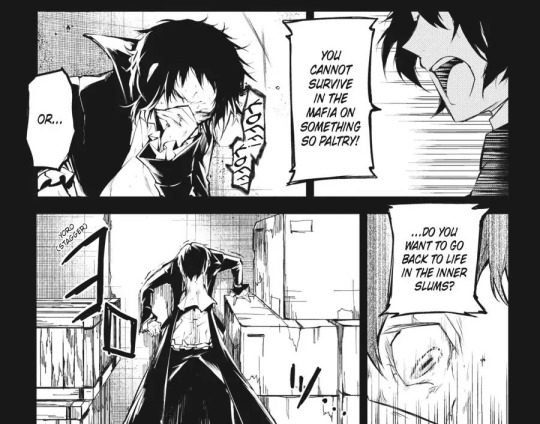
That looked like a great segue to talk about Dazai and Mori’s dynamic, but it’d benefit to go over Akutagawa first. For those who do acknowledge it as an abusive situation, Thank you for at least taking that step. Numerous don’t and it worries me at the state of what’s considered abuse vs. training. It may be both at times but don't excuse one for the other. Training needs formal consent and communication at some point during a session. Akutagawa is learning, but it’s the same as getting yelled at as a child for not doing your homework right, when again, you’re still just learning.
It might’ve been easier to see for those who do acknowledge it because of the visible physical abuse that happens, but let's not undermine the psychological abuse happening as well. Dazai has messed with his psyche on an abhorrent level through his degrading and threats, making him reliant to hear a single word of acknowledgment from his mouth. What happened to Akutagawa is beyond the mafia’s environment.
Akutagawa does not hate or want Dazai dead for what he’s done to him, but he does hold anger at the seeming abandonment he’s been put through… and at himself as well. Anger that he couldn't get to what Dazai wanted him to be before he suddenly left. So he proves himself by climbing the ranks and becoming someone feared. Spectacles of violence not because he enjoys the feeling of other’s suffering or the power over them, but to show Dazai that see? He's still worth looking at!
He stays in the mafia because he’s found a place there. Even if he could, there was no point in leaving the mafia after he disappeared because what would be left for him if he did? He will always be an unchangeable, horrific hound of the dark and there's no changing that in his mind. From an inference of his actions in the dungeon when they finally reunite one-on-one, he wanted to believe that he was above Dazai after all those years, but Dazai doesn't act impressed or scared or anything. After all that effort, he gets nothing but ridicule and mockery like he's back to being that little kid with an oversized coat too big for his body.
Worse is that he gets told that some new kid Dazai picked up, who didn't train to the extent he did to refine his abilities, is better than him somehow. He gets riled up and at first, takes out on Dazai, but all those threats about killing him and how he went against the mafia were empty. Even now he can't bring himself to hate Dazai, he needs his mentor to acknowledge him no matter what side he's on. He never let go of Dazai, his coat is proof enough of that. So he takes it out on the party that isn't responsible and is convinced he needs to overcome Atsushi to prove something to Dazai.
He doesn't hate Atsushi, not genuinely. He does the same when he’s told he’ll never compare to Odasaku, someone who objectively should’ve been the weakest member due to his status. He gets angry at Dazai’s words, gets angry at himself, then takes it out on the person mentioned, rinse and repeat. I’m not sure if I’m the only one to notice, but he genuinely believed that the meaningful life Dazai gave him laid in the mafia and being useful to its cause. He has no reason to be as loyal to the mafia if he didn't think this.
Dazai’s acknowledgment means more than just appreciation for his skills and strength, it means his life meant something by striving for being the strongest. It’s not about the acknowledgment at all. Whenever he critiques and shames Atsushi for how he lives his life, it just feels like he’s unknowingly shaming himself through him without having to acknowledge his wrongs. It makes me curious about how much the acknowledgment itself even matters to him and the validation it gives him to strive for this is an excuse to keep living so what he’s doing in the mafia even matters in the end. What counts as acknowledgment to him?
He's convinced his faults are what made Dazai turn away, he just doesn’t know how to do anything to fix it and can't fix it this late into the game. What does Dazai want from him other than being stronger? When Dazai directly asks him to do something important involving Atsushi, he’s confused. He has no reason to trust him to do these missions. He’ll take the chance to prove himself once and for all, but to be included means he's being acknowledged, so what gives? The number of times he visibly self-reflects can be counted on one hand because as soon as it shows, he goes back to justify his violence and ignores his faults.
As someone whose favorite character is Akutagawa, I’m disgusted that all people can take away from him is “Akutagawa is an obsessive fanboy that deserves no sympathy because of what he did to Kyouka” or “Akutagawa is a poor, miserable man that didn’t deserve what Dazai made him into and should be absolved of responsibility because it’s all Dazai’s fault”. Both are very shallow and very harmful to perpetrate as they continue the idea that a person can only be the abused or abuser. He's both and it's okay to admit that.
Quickly let’s clear up this: He is not the way he is because of Dazai.
What Dazai IS responsible for:
Akutagawa’s need for his constant approval and recognition
Akutagawa learning to hone his ability
Akutagawa’s toxic views of being useful
The reason Akutagawa’s still alive
The reason Akutagawa is the Mafia’s dog
What Dazai is NOT responsible for:
Everything else
Akutagawa’s lean toward violence, his one-track stubborn mindset, and his lone-wolf attitude are not a product of Dazai’s treatment, he’s always been that way because of his time in the slums. He got beaten down by adults frightened of his empty gaze, had to learn to protect himself and find something to eat to survive, helped take care of his sister Gin and his friends by himself, and everyone constantly dying around him. That’s the real reason his personality is like that. He is a victim of his circumstances in a society that deemed him worthless, so he also thinks of his life as worthless. That’s why Dazai means so much to him.
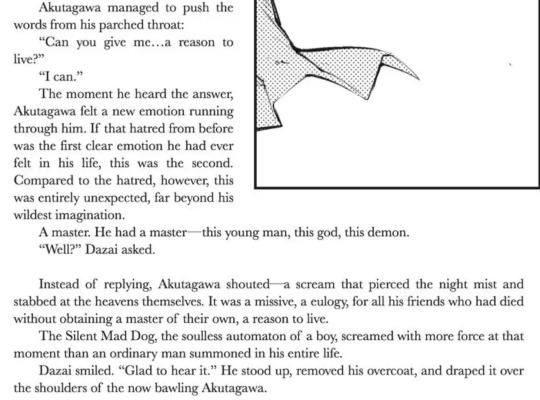
Dazai did not trick him into joining the mafia, Dazai expressed what he was going to go through was worse than what happened in the slums and gave Akutagawa an out that he could live a normal life with enough money, but he knew Akutagawa would not refuse because he still needed meaning in living, just like him. Gaining enough money to get by so he and his sister could get out of the slums would do nothing for him, he already felt that his life was worthless. He has no problem throwing it away at any time, he was gonna die young regardless because of his lung disease. It has manipulative undertones, but that's how Dazai usually is with even the people he cares about.
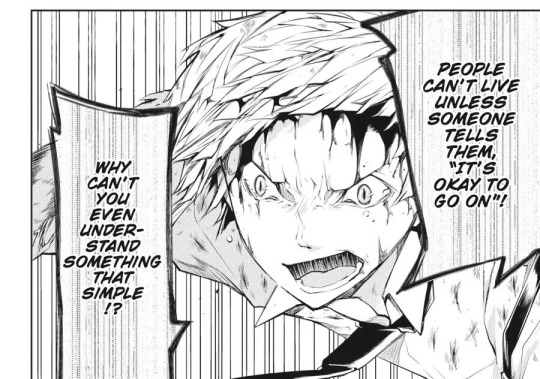
Akutagawa knows too well that a person needs a sign, someone to tell them it’s okay to keep going, and so does Dazai. Part of Dazai’s goal is to save Akutagawa from dying and give him a reason to live like he promised that day because he sees the potential that could come from his development. I don't want to sound like a dick again, but you’d have to be dense to think Akutagawa would still be dead by the end of this arc. He isn’t sending him off to his death, Dazai doesn’t know everything.
Even if he knew Akutagawa might die there, it's better than both Atsushi and Akutagawa dying at that moment. If Akutagawa didn’t want to die for him, he wouldn’t have, he chose to save Atsushi’s life. This is why I have to defend Asagiri. Let’s reread the interview together, to make it get across already.
(Twt link)
Q: Just like how Akutagawa and Atsushi's relationship has changed, I could feel the relationship between Dazai and Akutagawa moving forward too. Is it like what Akutagawa has said in Episode 3 of Season 5, that every order he has received from Dazai so far has been "a trial", "a part of a meaningfull life"?
First, the question being asked. They’re asking Asagiri about their relationship in the present, and how it’s developed. Akutagawa is no longer thinking he was abandoned by Dazai for a new, better student like he was made him believe, that was just to rile him up and interact with Atsushi more. Instead, he realizes that he’s not supposed to work against Atsushi, he’s supposed to work with him. How he decides to go about that battle with Fukuchi and whether or not he works with Atsushi like a partner is his trial. If this was Akutagawa before he met Atsushi, he would’ve no doubt escaped or might’ve thought defeating Fukuchi would prove himself to Dazai. He's not an obstacle to his meaningful life, his quest for a meaningful life lies with Atsushi.
Asagiri responds with:
Asagiri: Needless to say, Dazai is the most qualified person in this world to help Akutagawa grow. Dazai has a vision for Akutagawa's development, and he completely understands what it takes to achieve it. We, as obsevers, can only see bits and pieces of that vision. But I can at least say that Dazai's training plan has never been wrong.
Many find this answer questionable, I was stunned reading it myself. Asagiri is not wrong at all here though, Dazai is objectively the only person in this series who can find a way to help him. Atsushi is the endpoint, but Dazai has been guiding him to this point. Dazai himself said that he was planning to team them up the moment he met Atsushi, he was still thinking of him even after all these years. There are much scarier implications than thinking that Asagiri was wrong. It's that Dazai was doing everything intentionally to get Akutagawa’s mindset where it was. He didn't mess up with Akutagawa, he just couldn't personally teach him the skills he needed and chose a different route until he found something that could.
Asagiri is not saying the abuse was morally justified, but the intention behind it was not wrong in an objective stance. Dazai would know what to do the most because of his understanding of wanting to find meaning in living. Teenage Dazai couldn’t have achieved much by himself, even if he could understand since he also could not find meaning in life. That’s why he made him hang on to his every breath of validation so he would keep his faith in Dazai long enough for him to find a solution to this dilemma. The moment in life when he found Akutagawa was not ideal and he still did what he thought he had to do for him to survive in the mafia. Without his ability, he's incredibly weak and needs to be able to defend himself. A violent person could not have made another violent person unlearn their violence.
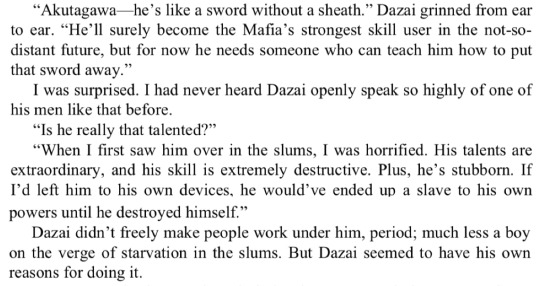
You could say he just wanted a weapon, but that’s not it, not even close. Many of you are stuck on the part that it was a suicidal teenager that picked Akutagawa up from the slums and that no way someone like that could teach another suicidal teenager anything, so it’s “comical that Asagiri thinks as though he’s the most qualified”. You’re not wrong in some sense, but this is still incredibly intelligent, “Black Wrath of the Port Mafia”, Osamu Dazai, and not just some suicidal teenager.
He’s also no longer a teenager. Right now we’re talking of Dazai in the present who’s grown and no longer needs to be how he was in the mafia, he has Atsushi now, someone who can help Akutagawa see what’s wrong in his outlook. The only thing he could’ve done back then was to shelter Akutagawa so he wouldn’t kill himself. It's horrible, but Dazai validating where he is now would do no good for either of them and fix nothing.
Q: What kind of person is Dazai to Akutagawa?
Asagiri: Actually, at the time of "The Dark Era", Dazai already spoke very highly of Akutagawa, as someone who would "become the Mafia's strongest skill user in the not-so-distant future". He just doesn't say that in front of Akutagawa himself. The reason he doesn't say it is that Dazai has to be "the presence that continues to give meaning to life" to Akutagawa. So far, that trial has been completely successful.
None of what Asagiri brings up is new information. He doesn’t say it in front of Akutagawa not to spite him, but if he gives these praises out too freely, he loses his distant, almost god-like presence in Akutagawa and will go back to being just a lone wolf with no exceptions that will carelessly get himself killed. Without any goal, he’s lost. Just like Atsushi and the headmaster and how Atsushi hinges on proving he can do a good thing to motivate his life, Akutagawa similarly hinges on the fact that if he fails, he won’t get Dazai’s approval.
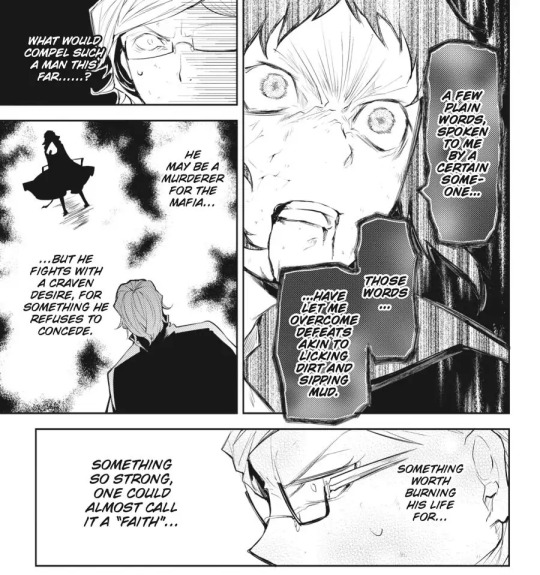
However, his death was not fully about Dazai’s approval in the way he's been preaching. In chapter 87, he mentions Dazai’s approval like always, and when they fail the first time even after trusting and working with each other as Shin Soukoku should, It hits him. What came into his head I cannot parse out at the moment, but his actions speak so much louder than any explanation we could've gotten. Of course, he's helping Atsushi escape, but what does he do for that? He used his ability on his shirt, and not just on the coat like he typically does.
It doesn't seem like a big deal at first, he could've always done that, but when was the last time he used it on something that wasn't the coat Dazai gave him? The coat means many things. His new beginning, his path in being Dazai’s student and successor (as that was also Mori’s coat), but it also conveys Dazai’s will that keeps him alive and that he's only strong with his coat. Without it, he's defenseless, so he clings to this coat the exact way he clings to those orders. It's his encouragement to keep going when Dazai isn't there. This overwhelming, suffocating responsibility, an oversized coat, is a lot to give to a kid but it's comfortable and he’ll grow into it eventually.
It was already a huge step in his development that he gave Atsushi his coat, but to use his ability not on his coat means he's making an effort to overcome his fixation and do an action unrelated to Dazai for the sake of Atsushi’s life. His whole life after the slums, everything he's ever done was with Dazai in mind. Him saving Atsushi’s life was not because he was doing what Dazai wanted him to do, that he'd finally get approval for doing It, and in turn give his life meaning before he died. When he saved Atsushi, it would give his life meaning in just that. He shouldn't let himself be defined by the past the way he criticizes Atsushi for, so he’s going to choose his meaning. I wouldn't say he's moved past Dazai yet, but he's getting there.
Dazai and Akutagawa’s relationship is not healthy in the slightest, and Dazai’s crueler actions and words against him are not right, but they’re still growing and not stagnant characters. Atsushi and Akutagawa learn from each other and that's what's pushing them to change. Nobody will pretend those past means weren’t just abuse, they were, but there's so much more to it. Like I asked with the director, was he successful? Well from what I’ve said, yes it so far has gone the way Dazai hoped for in the best-case scenario.
In the main universe at least, this is one of the better ways it could’ve gone. Beast is a different story. Teenage Dazai of the main universe was unsure of Akutagawa’s future and did only what he could’ve done at that time, but Beast Dazai does have that knowledge and he decided that it would be best for Akutagawa to not be in the mafia, instead bringing in Atsushi. It wouldn’t have been good to let him pursue his violent tendencies more than necessary in the mafia in this universe when he knew there was a better option, especially with someone like Oda, who would take the time to care for him properly.
Even if he didn’t bring him in, he still gave him the motivation to keep living for something. The prologue of Beast is a mirror to The Heartless Cur, with instead it’s a distant relationship of hate Akutagawa has for him for taking his sister. For those who argue that since Beast exists, that means Asagiri was somehow “wrong about Dazai”, but it’s still Dazai from the beginning that’s the source of this motivation. Dazai, who's still guiding him. If we’re gonna be honest, Dazai was putting their development/capabilities in speed run mode with the logic and future information he had access to prepare them for a timeline he won’t be alive for. There are many factors for what he did in Besst, but that’s not the conversation.
What does he get from helping him? Who knows, Asagiri wasn’t being cheeky when he said we only see bits and pieces of his vision. We barely have any clue what’s going through that man’s head, so don’t act like you do. He wasn’t always planning for the next Soukoku. Maybe it was a thought that came up sometimes, but he’s only met Atsushi recently. What about Akutagawa was so different from any other powerful ability-wielding orphan? Well, we’re not gonna know any time soon.
The point is that Dazai is thinking about their future, even if the abuse or manipulation makes that hard to see. Please do remember that abuse is still selfish no matter the intention, but non-selfish intentions make it all the more complicated to process. Their relationship is not misunderstood by Asagiri himself, it’s just clear to me most don’t want to face the unpleasant truth that there is more to their dynamic. When I first realized what was going on, I couldn’t help but get unnerved and awkward when someone would ask me about these two. These are both characters in the spotlight that you’re supposed to care about, but what happened between them is rotten.
You’re not supposed to pretend it didn’t happen because Dazai still contributed to who he is and it shows whenever it’s on screen. Abuse doesn’t make us stronger, don’t make it as if that’s a message that Asagiri is spreading. What happened to him motivated his development, but with Atsushi, that’s the opposite. Their circumstances are different and victims process what's happened to them in various ways. Depicting it in a form less common than usual doesn't mean the author thinks in the same way the victim does, it's just nuance at work.
I did not add Akutagawa’s attitude towards his subordinates and newer members as Dazai’s responsibility because Dazai is not the one controlling his hands when he hits Higuchi. Dazai’s mentoring contributed to his toxic views of being useful, but it’s only Akutagawa’s responsibility once he raises his hand. Instead of thinking of this in the context of the most typical abusive situation you can think of, how about this:
Your parent was raised in an abusive household, but they think they came out of it just fine and that there was nothing wrong with how they were treated. They treat you almost the same way, and all you can take away from that when you find out is, “At least it’s not as bad as it could’ve been”. You still hold anger at the standards they’re forcing you to reach, but if that’s what it takes to get that approval, then you’ll keep going anyway. Even if you get yelled at and you know you shouldn’t be treated like this, it’ll feel nice when you finally get on their good graces, right?
Then you get a new sibling, and all of that comes crumbling down. They don’t treat your sibling anywhere near the same when you were that age. Years go by and you get angrier and angrier. Why is it only you that was put to that standard? Even worse is that they treat you differently now too. You finally got to those standards, but now what is it worth? They’re so much nicer now and you want to curse them out for only changing now. Why couldn’t have had that parent from the beginning? It’s so unfair, but you can’t take it out on them because you still need them, they mean so much to you. As angry as you were, they were doing it because they cared about you in their way, you think. It was what your grandparents did to them at least. So you start treating your sibling similarly to how you were treated because you can’t take it that they didn’t experience that hardship without destroying yourself first.
Question: Are you right in what you did? Was the parent responsible for what you did to your sibling?
Nobody in their right mind would say yes to that first question. It makes sense why it happened, but continuing abuse will never be the correct answer. You’re doing the same thing your parent did. The second question needs more exposition to answer, however. How responsible is responsible?
In the end, even if it was the parent who influenced it, you’re only responsible for what you’ve done on your own accord. The parent did not tell you to take it out on your sibling, you decided that yourself. The parent is still responsible for what they’ve done to you, never get that wrong, but if you say that your guilt is absolved because it’s all their fault, you sound no different from any other abuser in denial. Are you saying now that the parent is also absolved from guilt because it’s all their parent’s fault too? Listen to yourself, You hurt someone but it’s not your fault, but the person who hurt you is also somehow not at fault? If someone came up to you and said that, you’d be fed up.
For those who do the same thing with Mori, rethink what you’re saying. Is it that painful to admit your favorite characters are at fault and that they’re changing? This comparison isn’t perfect and ignores some key factors: Dazai isn’t Akutagawa’s or Atsushi’s father and is not much older than them, the Port Mafia is a violent workplace environment and requires you to be able to navigate it a certain way, and all three of them at adults in present time. I used this comparison to be more real to earth and something a larger audience could process themselves to truly get that the emotions here are not straightforward even in a realistic situation.
Re: Portrait of a Father

Just like the prologue, in chapter 3 of the Beast light novel, Portrait of a Father is mirrored and retold in brutal upset that does not hold the hopeful bittersweetness at the end of it unlike its original. Before the present day, against all orders Dazai gave him, Atsushi attacked the orphanage on the day of his birthday. On his birthday, he would be reborn from the ashes of his past being burnt away, and kill the director inside to release himself from the fear of those memories.
It’s what he says at least.
Playing out, the director was expecting him. There might have only been one person in his mind who would’ve attacked a rundown orphanage on this scale. It frightens Atsushi after all that planning and fear of losing to the director, he could still see through him, but confusion takes hold when he’s told that he was late for his graduation.
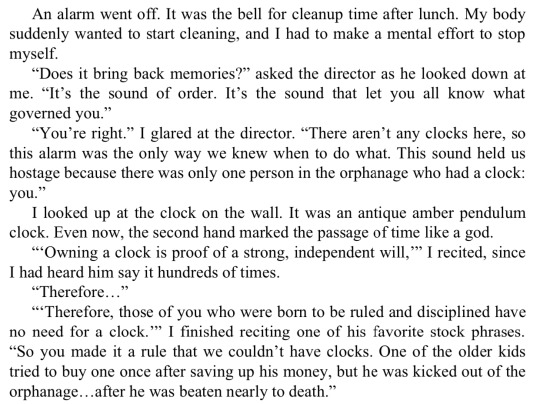
Graduation? Atsushi is in fight or flight mode, why is he approaching him with this box? He can’t imagine it being anything other than a weapon, nothing else would make sense for this cruel monster. The director won’t give him any straight answer, just repeating words he’s heard over and over growing up here. He uses his tiger hearing to glean what could be inside.
Tick. Tock. Tick. Tock.
There’s the proof, it had to be a bomb. He needs to protect himself before anything happens or he’ll die. He’s scared, he can’t move, but he has to fight. The director opens his arms for the embrace of his child… and death, plummeted into a bloody mess on the floor. Only out of the corner of his eye, only when Atsushi stopped, he saw what was in the box. It was a watch, brand new and high-end. Happy Birthday was what was written on a sheet of paper next to it.
His last words, whispered into his ear, were words of encouragement: “Yes… just like that.”

I was not kidding when I said this was brutal. Just like in the main universe, Atsushi learns why he did what he did and can’t place any of his feelings, but overwhelmingly guilt crushes him to keep protecting people with his life rather than just fear because he killed him. He finds out much earlier about what happened with Shibusawa, and how the director protected his identity as the tiger.
The director’s intentions are draining when you let your mind wander. As we’ve established, the headmaster as a figure of hate for Atsushi is intentional on his part. He doesn’t explain anything on purpose here to probe him into killing him. He bought that watch for Atsushi as a congratulations for growing up and becoming a new independent individual.
In the split minute before Atsushi took the first swing, he said his usual, “Those who fail to protect others do not deserve to live.” I have to question now if he was so willing to die there, even encouraging him to kill him, then has it been this whole time he still can’t live with himself for what happened to his friends… or is it because he couldn’t protect Atsushi anymore? Maybe I’m overthinking it and it was just that the headmaster thought Atsushi needed to kill him to remove an obstacle in his growth as an individual, to be a necessary sacrifice for his benefit.
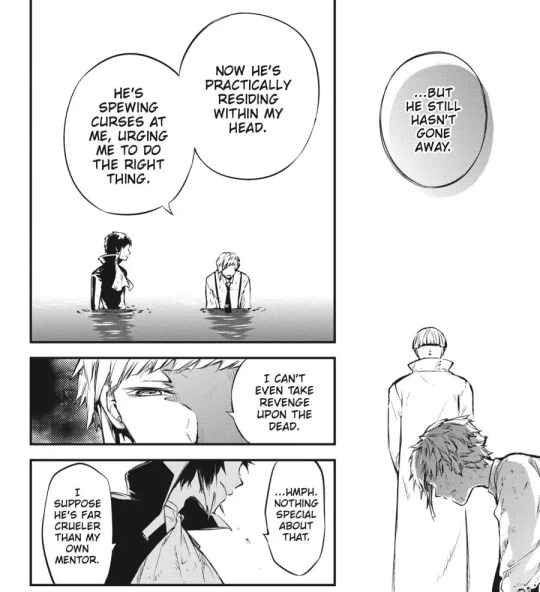
It's too flawed though. The director will never leave him, not after all that he's engraved into Atsushi. The watch has become not a symbol of a person who's found himself, but a child that's latched himself onto his father's cold corpse that won't ever respond, but that child would do anything to have him wake up and say "Good job, Atsushi". The director also has a clock, but can he call himself a strong individual when he hasn't let go of the past either?
Time stopped for Beast Atsushi when he picked up that watch. If he had just followed orders, none of this would’ve happened. If he isn’t his father’s child, if he doesn’t uphold his last wish, then who is he? When he’s no longer in the mafia and has time for himself to think, he wanders.
He failed in becoming someone he could be proud of, he deserved to die for that but doesn't want to be dead… because It wasn't truly about the Director, just like how it wasn't truly about Dazai’s acknowledgment or saving his sister for Akutagawa. At first, that was the motivation, it's the reasoning they keep going with, but in the end, it was to save their own life and give it purpose to validate why they're still around. If they can die like this, then it's all the same. If they have their own life in someone else’s hands, then they no longer have to be responsible for their own heavy-hearted weight.
Beast Atsushi is given neither and is taken of his reasoning, but he keeps going. Aimlessly.
Luckily, it’s not where his story ends.
He wakes up in his old orphanage, and it’s no longer the dreary place it was when he was younger. Kids laughing outside, no chains on the walls or bars blocking off the windows, and the new Orphanage Director greets him. He tells him that he will go back to being a student of the orphanage until he can become independent again, under one of Dazai’s last requests before he died.
Still, there’s one thing he needs to do. The new director takes out the watch and tells him to break it. Atsushi is distraught by this notion, but he won’t let Atsushi leave if he doesn’t. The new director has good reason, there is no point in becoming someone the past director was proud of and this is what’s holding him back. Atsushi, eventually, tells him he will not break the watch. He can’t move on just yet and this watch is still proof he’s himself, yet…
He’ll keep going and move forward, just like Akutagawa told him after he spared his life. The new director finds those words to be enough, saying he can’t leave until he finds something else to define himself with, but he can keep living here as his son. He went there to burn away his past and came out of it not able to let go of the past, but now he can redo and process it healthily with someone willing to hold him like a father should.
The Man Who Raised Dazai
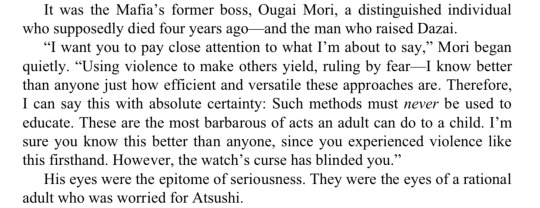
Everyone who’s read Beast has questioned it: Why did Dazai in his right mind have Mori take care of an orphanage? Why did he save his life? Better yet, why is he so nice?! I have come up with some speculation on why Dazai would.
“Beast Dazai recognized this potential of change either from the multitude of universes he was able to witness or recognized it in his own considering canonverse Dazai never does anything against Mori (even if he visibly dislikes him).”
“Possibility is one thing, the why is another. It was either that he saw potential and good that could come out of this in the long run, Mori’s intelligence and expertise still proves usefulness, less dangerous for Oda in the long run if he let Mori stay there instead of the Mafia, or all three.”
(Didn’t feel like rephrase them)
We can’t know anything for sure about his decision, but I do know Mori is the type of character to sacrifice his feelings for what he thinks would logically benefit the sum, and there’s no better way to release yourself from that too-calculative responsibility than to remove yourself from it and to be in a place where you’re allowed to care for others and express yourself when there is no greater purpose than to just grow.
What happened with Yosano is undoubtedly wrong, but Mori had put away any sympathy in those situations because he needed her to do what he brought her in for. I was confused by his declaration that violence should never be used to educate children when I read it, especially out of his mouth, but now I understand. He would know with certainty that it’s not the right way to educate children, particularly because this is a Mori that hasn’t been in the dark for these past years and has grown to care for these children at the orphanage without any greater intention for them.
He’s not like the Old Director because he has no reason to think these kids would end up the way he did. They’re just kids that need someone to raise them with kindness, kindness will be what gets them through life as functional adults. Abuse has too many drawbacks to be called an optimal solution here. Is it surprising that all it took to change Mori was the kindness and salvation Dazai offered to him when he took over? Can you believe it was that simple to treat someone like a human being instead of a figure of hate?

What sticks out to me like a sore thumb is that when he’s introduced in Beast, he’s referred to as the man who raised Dazai. He is, regardless of what you think, the closest thing Dazai has to a father figure. In regards to how the fanbase speaks of their relationship, it’s hard to think that he cared about Dazai, but he did and the extent of how bad it got between them is grossly exaggerated.
As many comparisons Dazai gets with Yosano, their relationship with Mori is very different. Unlike Yosano, he did not need to be forced to do anything with psychological abuse and he did not need to be torn down to do what Mori asked him to. We don’t know what happened to him to become like this, but it wasn’t because of Mori. Yosano had light in her and a motivation to do the right thing, but Dazai didn’t. Dazai is no stranger to any violence or using violence himself even before Mori if he's this desensitized.
It’s useful that Dazai is like that when he meets him, up until it isn’t. He’s moody and actively looking to die. Mori can’t predict him that easily and Dazai can see right through him. There’s another huge difference between them though: Mori sees himself in Dazai. We don’t have enough insight in his head to make conclusive statements, but I think this is why he cared for Dazai. It’s not because he saw a child struggling that he cared, but grew some fondness because he saw a little mini-him. When he drove Dazai out of the Port Mafia, he expected him to come back and take back his vacant seat.
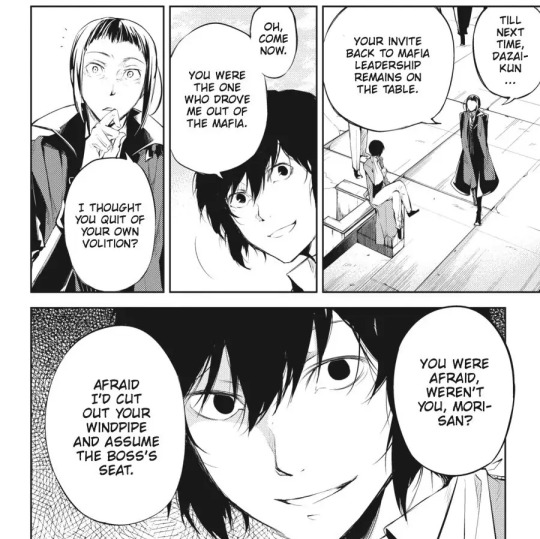
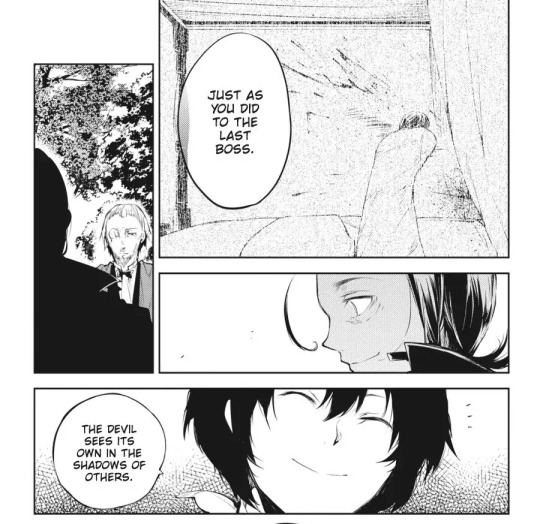
Eventually, Dazai will come back and realize that petty anger about someone dying is illogical in somewhere like the mafia. But because of him not being able to see through Dazai and seeing himself in him, he also expected him to eventually usurp his seat if he stayed any longer. That is why he had invited Mimic at the time he did and manipulated the situation so Oda, someone he knew Dazai cared for, would go and take care of the situation flawlessly. He’d be sacrificed and Mori could get something out of it, a Skilled Business Permit. A perfect plan… in theory, but Mori was wrong and miscalculated on many levels because of how many assumptions he made about Dazai.
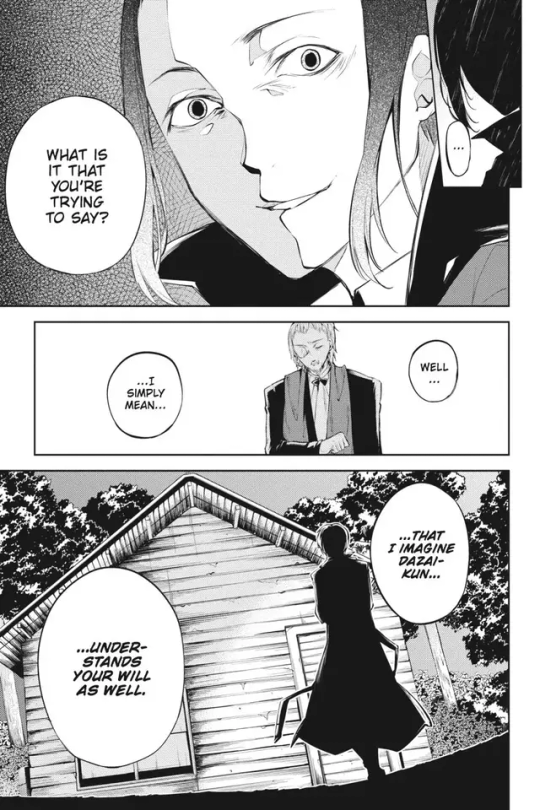
First, he wouldn’t have known that it was Oda who held the words that would convince him to leave the mafia and go into the world of light. Dazai will never come back to his own volition. Second, as those panels quite literally tell you, Dazai was never planning on killing him. He saw his place in the mafia and saw that he was needed there. When Mori finally realizes his mistake with Dazai 4 years later during the Guild Arc, he can’t go back. His plan was still perfectly sound and he still got what he wanted out of it. He shouldn’t regret it, but…
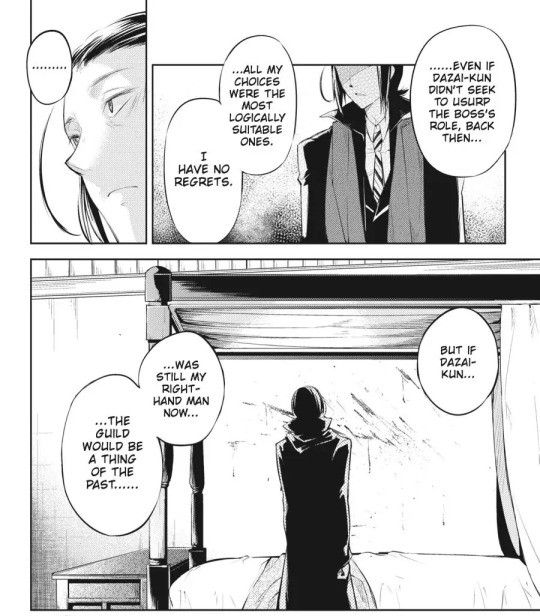
Now that’s been paved out, where does wanting to save Dazai fit into this? If I had to assume, it’s the same reason he didn’t shoot Dazai for leaving his office during Dark Era. He cared about that boy, for 4 whole years he left him and his seat alone when the logical thing he should be doing was replacing him, but as much as he might’ve cared, he needed to put the mafia first. He didn’t let him die because of his use, but also because of their so-called “common destiny” in his eyes, a diamond in a rough he might’ve disposed of otherwise if he didn’t see his potential. There’s not much he could’ve done for Dazai here except keep him healthy and alive. Mori gets tons of flack for not trying to help him, but there's nothing he could've done, not in their position.
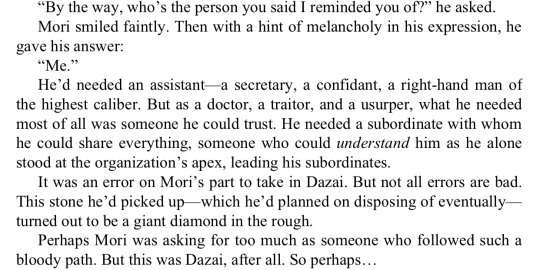
He can't cultivate his potential if there is abuse involved because there is no logical reason for him to do anything to Dazai. You guys have to stop assuming the worst when it comes to Mori, you’re missing huge character details that are right in front of you. The difference between Mori, the Boss of the Port Mafia, and Mori, the Orphanage Director is that he had time to rekindle his humanity so he’s able to care about him like a normal human being, feel guilt, and admit regret after Beast Dazai has died. Mori at most was responsible for ingraining tactical strategies and theories and molding him into the perfect Mafioso and right-hand man.
Not to say any of those aren’t a bad thing. He’s still a child and having him use his desensitized, intelligent mind to build the potential in what he could do for the mafia, it’s just that he’s responsible for very little in Dazai’s personality. The only answer I could give about Dazai being abused by Mori or being abused under the credentials that he’s a child in a violent, unsafe place is the same answer given earlier for Chuuya: in his case, not really.
Regarding this, I retract my statement about anything I’ve said about Beast Atsushi not being a victim in his time in the mafia, but I still hold my stance that he’s not the victim of the port mafia. I want to say the same thing about Beast Dazai and Atsushi that I do here, but considering he picked him up and trained him like how he trained Akutagawa, there’s a great chance Dazai emotionally abused him when you read their interactions. Not physically as that would make him too much like the headmaster, but just enough emotional distress in bringing up traumatic moments to manipulate him into doing what he needs of him.
It’s not a good relationship, but Mori wasn’t targeting Dazai in any real way like the Director and Atsushi or Dazai and Akutagawa. Unlike every other section, I have to conclude that he didn’t do anything to Dazai in that regard other than treating him like another adult when he shouldn't have. I don’t have much to say negatively about their dynamic otherwise. Just a weird, terrible son with his weird, terrible father. It’s more like someone who's taking after their mentor’s teaching and methods rather than an abuse victim echoing their abuser. This is why I don't accept the “Cycle of Abuse” as how the fandom understands it. It tells me a lot that people resort to the blame game.
I wonder what Dazai and Mori’s relationship would've looked like without any of this in the middle. Maybe something in cadence with Ranpo and Fukuzawa, but I can't help thinking that accepting Atsushi as his son in Beast instead of a student wasn't just for Atsushi’s sake. He was about to call him his student too, but immediately changed his mind. He already admitted he was helping him because of what happened to Dazai, so it can’t be a huge jump to think that in the same way this is Atsushi’s redo in building a relationship with a father figure, this is Mori’s redo to give him some atonement for the boy he failed.
A Mother’s Love
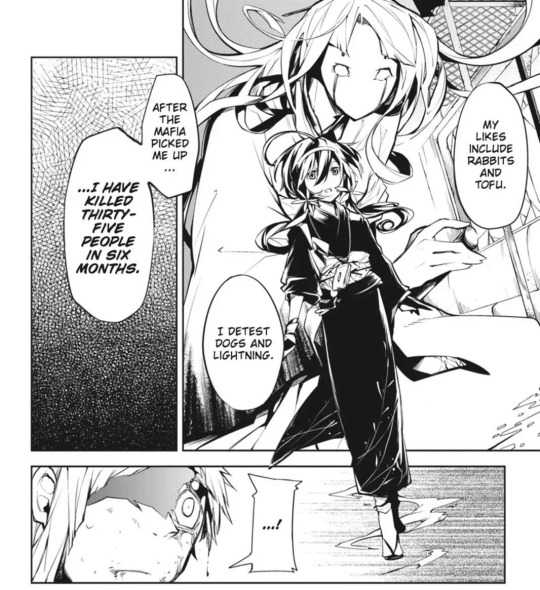
Kyouka, when we first meet her, appears as a force to be reckoned with. With skills a young girl shouldn’t have, and a demon shadowing behind, she’s a terrifying opponent. Quickly though, that appearance falls short in tragedy when the bomb Atsushi’s after is found on her own body and when he asks if she truly wants to kill... She has no answer, but her actions speak clearly. She gives him the defuser because she doesn’t want any more people to die, but the man behind the phone will not let it defuse.
So Kyouka does the next best thing to save more from dying: falling off the train with the bomb that’s about to go off. As long as she dies with it, nobody can use her and her abilities to massacre the people on the train when the bomb eventually fails to do what is necessary. Because that’s when Atsushi realizes that she cannot control her ability herself. No matter what she genuinely wants, she will never have the ability to obtain it because of this one fact. She can only be what people tell her she is.
We all know this story well, she gets saved by Atsushi and the man behind the phone is Akutagawa. Atsushi offers her the same kindness Dazai extended to him regardless of his reputation and destruction because it’d only be the right thing to do. He knows her incoming fate of eventual death for her crimes, he can’t do much, but she should at least experience normalcy this one time.
When she’s about to turn herself in, Akutagawa stops her and tells her she did her job well as a decoy for him to capture Atsushi. I don’t know if you’ve noticed, but there’s a peculiar oddness about Akutagawa here in his attitude towards Kyouka. In all logic, even though she is a strong tool to the mafia, she’s a low-level member, a disobedient one at that, and should’ve been killed on sight for her betrayal considering how quick he is to violence, but he talks as if nothing even happened. He brushes off any thought of her dying as she’s spouting nonsense and that she’s going to go back to the mafia as normal.
But then he spouts off about how she’s better off dead on the ship if she stops killing. What’s up with that? It’s not completely obvious at first, but he’s projecting his own experiences in the slums and beliefs formed from Dazai’s mentoring onto her. From his time when he wasn’t in the mafia, he tells her there’s nothing left out there for people like them, there’s only rock bottom. He can confidently say that there is nowhere that would accept her for her ability, demon snow, because it’s the same for him.
The only way her life can have value is to kill to be useful, just like any good mafia member. It’s exactly why that flashback with Dazai happens here. He’s the one who fed him these thoughts he’s lived with for these past 6 years, and what she’s been believing for 6 months. He doesn’t loathe her, he sees it as doing a favor for her. What else can a little girl who can kill be use of except to kill in her circumstances?
Contrary to popular belief, he is not her abuser and is not the same thing Dazai was to him. He neither trained her nor did we have information on their relationship to come to that conclusion. The only thing we know is that he was the one sent to pick her up by the Port Mafia. We can prove she is not the way she is because Akutagawa since Beast, well, exists. She is one of the few characters I can confidently say was a victim of the Port Mafia itself and not just a person of the Port Mafia specifically.
Akutagawa was trying to be what Dazai was to him, but he is selling a bastardized version of it to her. The person who was her Dazai was Atsushi, the same person who was given Dazai’s act of kindness. Someone who has experienced the same things Akutagawa has and is living proof that she can hope for something better.
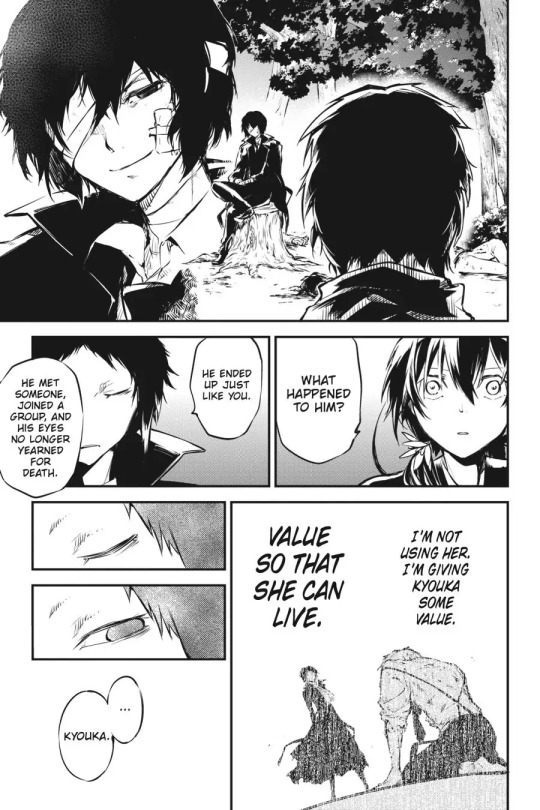
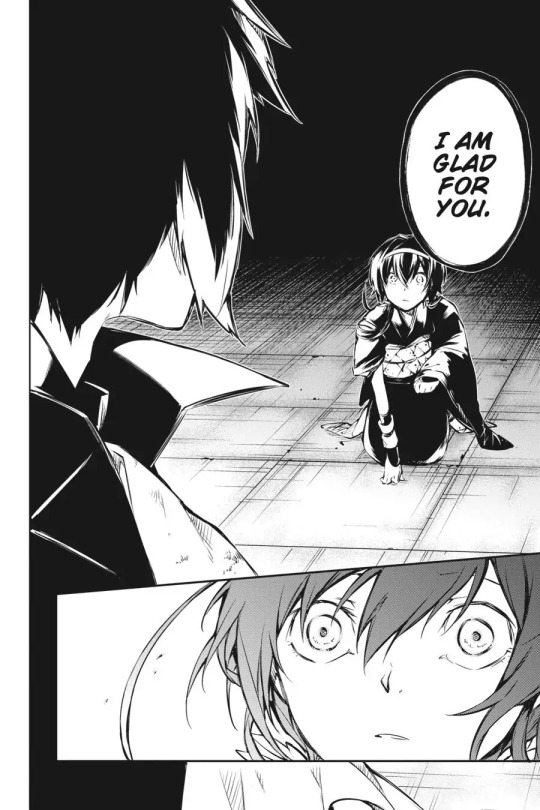
He could see that the same revenge and lack of regard for her life in her eye was the same kind he met Dazai with. Despite that, these lessons he’s internalized have helped no one, not even himself. She can’t find meaning in something that is the root cause of her suicidal ideation. This life is unfulfilling for people like them who need meaning in life. Akutagawa doesn't realize this because he still has Dazai to be his motivational goal. That’s why he failed to help Kyouka, Dazai’s efforts would’ve been considered an utmost failure too if he wasn’t actively trying to fix that misunderstanding. Kindness is what actively saves us and helps us grow, the harm in abusive environments will only stunt us. But what happens when kindness is offered to us, but nothing comes out of it except proving us right that we’re unsavable? Then you have Kouyou.
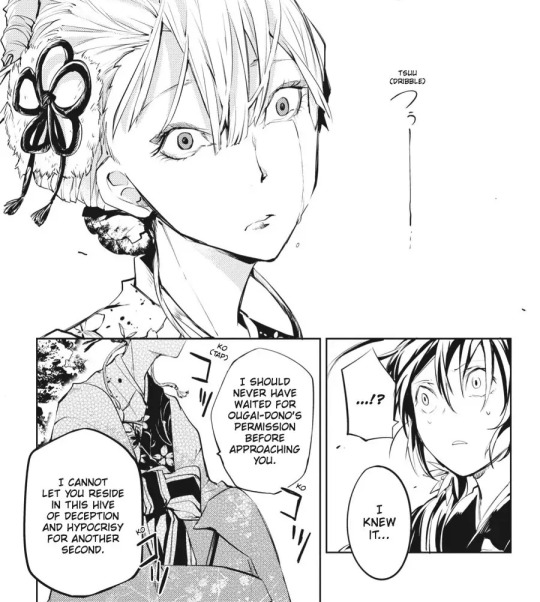
Kouyou is the second person I could say was a victim of the Port Mafia. She has the same belief Akutagawa had about people like them being unable to be saved, so the only thing they can do is embrace it. I can’t claim she was Kyouka’s abuser either as we again don’t know enough, but that doesn’t change that her behavior is emotionally abusive, and is a much better contender than he is.
She’s doing the same thing Akutagawa was doing himself. Seeing themselves in this child and doing what she “needs” instead of what she wants. Just like him, she views this as saving her from the hands of light that will never make room for them and will ignore everything else she says. When Akutagawa is faced with her “disillusionment”, he… accepts it when she refuses his will and chooses another path, but almost kills her to spare her from that decision that would “doom” her.
Kouyou is much less accepting, opting to kill the root source of this hope itself, Atsushi, because her fondness for Kyouka prevents her from leaving her for dead. In contrast to Akutagawa’s attempt at being what gives her life meaning, Kouyou wants to stop Atsushi from being like the same man who also gave her hope that they could escape to the world of light. She can’t bear to see Kyouka go through the same realization she did far too late.
I can see what you're thinking, why am I reluctant to call either of them Kyouka’s abuser? Even if Akutagawa doesn't count, shouldn't Kouyou count because she seems to have an actual relationship with her and her effects are prevalent in Beast, the same points I mentioned to debunk accusations against him? Sure actually, but think about it like this. What the Port Mafia does have in common with real situations is that this is a community that is full of victims who refuse to process their traumatic experiences for any reason, and bring down others to their level when they don’t fit in their narrative to justify what’s happened to them.
There isn’t just one abuser weighing over you, there's this collective pressure from so many who aren't your abuser but they still contribute to your abuse with their presence itself. If Dazai wasn’t there in the mafia, would Akutagawa's situation have changed? Yes. Now if Akutagawa or Kouyou weren’t in the mafia, would Kyouka's situation have changed? Not at all. She’d have fewer examples to refer to, but she’d still be abused. If it’s easier to imagine, think of it similarly to cult mentality and how they keep you in cults. That is the reason I emphasized being a victim of the Port Mafia instead of an individual. Kouyou, Q, and Kyouka, while you can pin their main perpetrators on certain people, their overall situation doesn't change.
Now why doesn’t she just use the phone herself instead of letting people call Demon Snow for her? Wouldn’t she have more agency that way? Atsushi proposes this, but she rejects it instantly. It’s a very simple answer, it’s the same reason she can’t bear to look at it outside of when she’s forced to use it in combat. It’s her ability that killed her parents and why she was forced into this position.
It’s not hard for a little girl to believe she’s nothing more than a killing machine when she sees that night her ability would mercilessly kill her parents. She eventually caves when Kouyou points out how quick she is to vindicate violence to protect that hope she desperately wants a part of, and how she will never change. Her first mission with the Armed Detective Agency is proof in itself. Was Atsushi going to keep extending his kindness after hearing what she could only blame herself for?
Kouyou is a character I’ve seen that gets a lot of double standards compared to all of the other characters I’ve mentioned with abusive tendencies and is almost purely liked. She’s not seen as an absolute monster (The director, Mori) or controversial with one side containing pure dislike and another pure love (Akutagawa, Dazai), it’s only that she’s a well-written, sympathetic badass girl boss. It’s either because she’s a woman, that she doesn’t use an overt intimidation style, that her motives are more obvious in their emotional influences, or all of the above that she’s not treated the same.
Kouyou’s motivations are not special, as I’ve said. The only thing that differentiates them from the others is that they’re not covered by a mask of indifference. As fond as she is for her, she’s not much different from anyone else who holds the mafia up in high regard. She weaponizes her words in where they’d hurt the most so Kyouka would come with her. The entire last section of their battle sums up with her saying, “Kyouka come with me, they’ll only use you for your Ability when they get a hold of it. Even if the mafia did the same thing, at least they’ll accept you for who you truly are: a natural-born killer. You don’t have to fight anymore, I’ll protect you.”
When Atsushi finds Kyouka once again subsequently in her disappearance, she chooses to embrace her violence to help the Armed Detective Agency in this fight with the Guild. After her walk in where she used to reside, she comes the the conclusion she no longer belongs there. Against Kouyou’s wishes, she will brandish her blade for a home. That blows up in her face the moment she starts. Atsushi gets taken, and it’s just as Kouyou said would happen. If even her violence doesn’t get her wish, then what can she do besides leave herself to her fate?
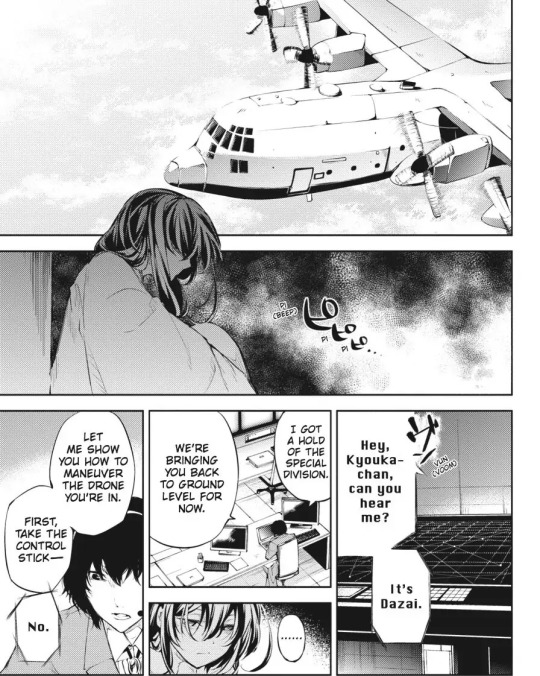
As someone who’s seen another with a talent for killing walk the path of good and is on that same path himself, Dazai talks to her. He tells her about how she hasn’t gone through her entrance exam yet, how she isn’t an official member because she hasn’t proven her will or life on the line to help people she doesn’t necessarily know. Kyouka doesn’t believe she could’ve passed if that’s what it takes, but Dazai doesn’t agree with the points she’s brought up. So what if she’s killed or considered dangerous? That doesn’t make her less qualified to be a part of the Detective Agency, everyone there is from different backgrounds.
She can’t know everything, not even about herself. Nobody does, but it takes others to see more of yourself. Excelling in one area doesn’t prevent you from nurturing your potential in another. What would that make someone like Atsushi, a person who’s been her guiding figure throughout—but was never seen as anything more than a threat or a beast because of his ability before he joined them? The truth is, our lives aren’t defined by one purpose the moment we’re born, it’s only something you can make for yourself. We’re not the places we’ve been raised in, not the ideas people apply to us, and we’re especially not defined by the traumatic experiences we had no control over.
All of it accumulates the person we are today, and we can’t change that no matter how much we resent parts of our image that don’t hold up to what society deems as right, but it shouldn’t take control over what we want for ourselves. It isn’t fair for the victims who were forced into a life where they had to fend for themselves, the children who had to navigate an adult’s messed up world that didn’t have room for them to grow as kids should. Forced into a box where they stay unaware that they’ve ever left their mother’s womb, break out in fury with eyes that grew up too early—only to become lost and thrown away, or rot in that box without a single person knowing they were a breathing, living human being.
I deem abuse selfish for this very reason. Kouyou is wrong for this very reason. If she finds comfort in her reasoning, then I can’t critique her for her own choices and will have to respect her for choosing to stay in the mafia even when the old boss is dead, every abuse victim is different, but not a single person is born evil or good, in the dark or light. Not a soul has to stay in one place because they started there. It’s going to be a hard journey to truly achieve what you long for, results aren’t immediate and not everyone gets there no matter their effort, but still try. Try because it’s still worth trying, because you’re still worth more than you think.
In parallel, you can only get there as long as you’re seeking it. Too many see the Armed Detective Agency as something that will automatically save characters just by working there, but the only way it can help them is if they seek out their help themselves. The ADA is not the right place for every character, but Kyouka does want a place there. After her conversation with Dazai, she knows what she wants to do now. She will smash the drone she’s in into Moby Dick so nobody will have to die, but sacrifice her own life in the process. She’s chained to this place, but her choices aren’t.
She doesn’t have to die with regret, with this she can pass the entrance exam and become an agency member like she wanted. She made a difference for herself just by this act. It’d be a pretty melancholy arc if it ended like that, thank god we know it doesn’t end like this. When you become a full agency member, you gain more control over your ability, meaning—
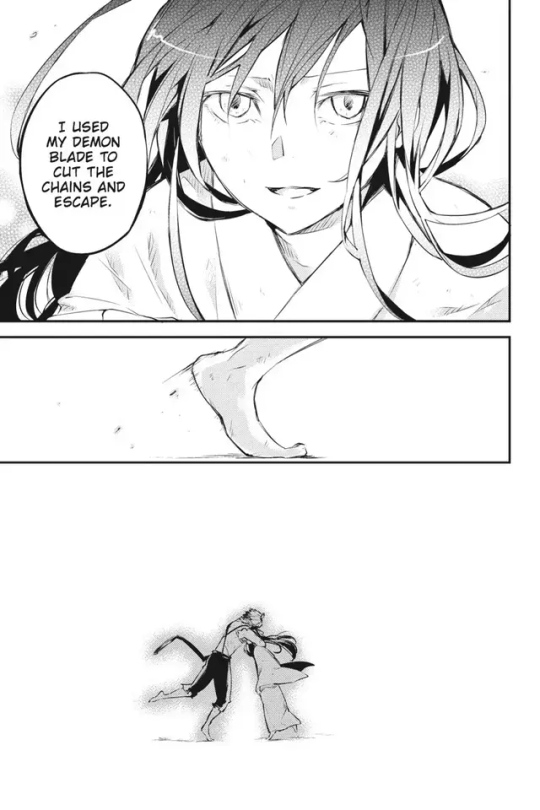
She’s fine.
The exposition is over, let’s talk about Kyouka. Her arc is beautiful and the neglect to talk about her when it comes to her abuse story besides saying, “She’s the one who stopped the abuse cycle” and then nothing else is heartbreakingly superficial. She didn’t stop it, it’s impossible to, but she did break out of it. Kyouka’s section has more exposition than the others but I expected that. I wanted to save her for last because she’s the only one whose arc has come to a peaceful conclusion and not unfinished, and the lighter message felt nice to leave off on.
I shouldn’t berate Kouyou too much, the only reason she stayed in that room after being captured by the ADA is because she did want Kyouka to experience what she never had, and speaking with Dazai helped reassure her that Kyouka would be able to achieve her dreams. It’s no longer the age of the old boss. As well as her shedding the truth about her parent’s death so she wouldn’t have to resent her ability as not an avatar of massacre, but a product of her parents’ love that will always stay with her. She didn’t let go of the phone she’s had this entire time because her mother told her not to let it go.
Me going over Kouyou in this fashion is not me saying you shouldn’t love her character, I like her too. It’s just that it’s passed over so fast what she did, but somehow Akutagawa is more at fault here is mind-boggling. I’d get it a little more if this is because she redeemed herself by wanting the best for Kyouka over what was best for the mafia, but I doubt that’s the case when that moment is talked about so little as well.
I genuinely need you all to understand that not every character is going to have a satisfying, clean conclusion like this. Akutagawa’s story is most likely not going to have a conclusion that satisfies everyone and you should respect it when it comes. There’s no perfect way of writing abuse, but there’s no correct way of doing it either. I don’t think Dazai is going to have the repercussions you want him to have any time soon. If you got the message from Beast, getting revenge on an abuser doesn’t make us feel better or let us process what happened to us. Total resentment keeps us stuck.
The only thing that will heal us is the kindness so many offer in this series. You in no way need to extend that kindness to an abuser, you don’t need to forgive them or let them into your life again, but be kind to yourself and don’t let resentment prevent you from focusing on yourself. Forgiveness and reconnection are not the same thing. Don’t be angry when a victim does want those things. Unless it’s character inconsistent, that’s not something we shouldn’t have any opinion on as the right or wrong way to go about their lives. What if later they do change their mind and want something different from what they originally planned? That’s fine too. Everyone is different. Don’t give unsolicited advice to people who do not want it, let them decide for themselves. It is the best thing you can do.
The worst abusers are the ones who refuse to change and see wrong in what they’re doing, but what about the ones who do want that? Then also let them heal. They did something awful, why isn’t it a good thing they want to stop it now? You don’t have to let them in just because they changed though. Apologies don’t fix the damage already done, but to some victims, it feels nice to feel that what’s been done to them is acknowledged. You don’t want them to hurt others the way they’ve done to you, and neither do they. It hurts to let them forgive themselves when you haven’t and never will, you want to see them suffer, but that’s the only way things can change.
Dazai has changed, is he a good person even after what he’s done? I despise this question for any character of this series. He’s grown so much, and if you don’t think so, reread his conversation with Kyouka I beg of you. It is a far cry from his mindset in the mafia. A better person for sure, but a good person is hard to define for anyone in this series. The mafia is still the mafia, do any of them qualify as good people? The government, even if it’s the position of the right in society, is still an unjust system.
What a good person is cannot be an objective answer, people think there is but it’s not. A good person is how much we know about them and where our position in life affects our viewpoint. Prejudice values don’t make you correct in what you think a good person is, being convicted of a crime, one you might not even have committed, doesn’t automatically make you a bad person, being associated with a group doesn’t mean anything about who you are, etc. It’s all subjective in the end.
Meaning someone like Odasaku is essential in a story like this. He still has a presence in this narrative, even if he died in a light novel, because his existence pushes the boundaries of a “good person” in the fact his contradictory existence establishes itself. He failed in walking the path he wanted, but he doesn’t regret it even in his dying moments trying to.
Afterthoughts
The themes of morality and humanity go hand in hand with the abuse present in Bungou Stray Dogs, so it was hard avoiding talking about this when it was necessary. I don’t think it’s right of us to judge a character’s path that isn’t finished, in a story that’s nowhere near done. Ultimately, I’m only talking in a place of experience but never will it make me exempt from any personal bias. I tried to be as objective and nuanced as I could about this, and I hope it shows.
Abuse isn’t one of those things that I can analyze from any logical stand point or take resources to back my statements up about abuse. Of course everything I say can be backed up, but abuse is a personal, human matter and we’re just human being trying to figure out more than we can handle. I just couldn’t be comfortable with how people are now choosing to talk about Asagiri and needed to shed some light in what you’re missing.
Now I could’ve gone over Higuchi or Lucy because their stories also involve abuse, but I don’t think I could say anything new about them without repeating points I’ve already said. We know very little about Higuchi and what made her so devoted to Akutagawa, and Lucy is pretty quick to summarize considering her story is just like Atsushi’s. Q is also a character to be brought up but I don’t have enough information on them to say much about any abuse itself that happened.
Yosano was also an option but I don’t think anyone had any trouble understanding her backstory. Well I was only really aiming to speak about what’s not been spoken enough. Thank you for reading haha, god this thing is monstrous. Already got to 14k words by the time I was officially done…. I didn’t know if I wanted to lean into character analysis or just exposition, I hope it’s a good enough mix of both. This took way longer than the 4 days I was planning to write this in.
I was later reminded that I could do a post on how their abilities functioned and reflect on their abuse/traumatic events, but I didn’t think I’d have enough room for that here. It could be a bonus post eventually? I don’t think I did Kyouka enough justice in that aspect, but i’d just be beating myself up again about not making this perfect.
I hope I don’t come off scary or a very serious person? I’m very open to requests or discussions people want to engage in. Oh jeez, I’ll just embarrass myself if I keep talking. Writing this was a bit much, never really liked writing stuff myself. Sorry if glossed over anything, I wanted to stay on topic and not detail into something unnecessary.
The message BSD has is a pretty normal one, but there’s something very special about how it’s written here and I’m happy it exists. Maybe I shouldn’t have made this so long? But there’s so much to express sigh……
#bsd#bsd spoilers#bsd manga#bsd meta#bsd analysis#bungou stray dogs#bungo stray dogs#atsushi nakajima#dazai osamu#meta#analysis#akutagawa ryuunosuke#kyouka izumi#mori ougai#bsd beast#beast atsushi#ozaki kouyou#chuuya nakahara#SIGHHH I NEED A NAP#THIS WAS TOO MUCH EFFORT FOR ME
232 notes
·
View notes
Text
Why are the Uchiha considered a non-oppressed group? Naruto's fandom, specifically pro-Konoha readers, tend to claim that neither Sasuke nor his family was actually oppressed nor discriminated against prior to their killing; furthermore, some tend to state that it's for this supposed reason that the massacre was justified, as not only they perceived no injustice when presented with evidence of their treatment at the hands of those in positions of power (who should've had guaranteed their survival at the very minimum, as that was the reason for the village's creation), but also consider their plan to coup a consequence of their "traitorous" nature; a disservice after everything "Konoha did for them".
Some other fans, not much smarter than the first group, are willing to admit some of the discrimination they suffered; but they are reluctant to see such conduct as a learned animosity, labeling it as a "modern occurrence" (when speaking of Hiruzen's timeframe). According to them, the Uchiha had just begun to be discriminated against, so their reaction was disproportionate; apparently, it's mandatory to wait for such bigotry to be repeated for a few generations before considering it a systematic occurrence rather than an isolated event.
Genocide doesn't happen in a vacuum, it's not an option that is plausibly considered if not after years or decades of cultural and political repression and degradation. It's the growth of a slow but consistent process of dehumanization, to the point where those taught under such a regime of thought truly consider their life, rights, and opinions far more valuable and important than those they degrade.
Arresting or even killing the clan members that actually wanted to coup would've been far more understandable had those in power seen Uchiha humane enough for their lives to be considered, to matter; yet the elders quickly saw mass murder as an enticing option, sending one of the kin they wanted to exterminate to do their dirty job so they wouldn't lose "one of their own" and still look pristine.
They were able to do so and still see themselves as agents of peace because they were taught that they were on the right side of history, as the story was told from their perspective; the handwriting of their mentor shines dark and spotless on the parchments of their national library.
And, as for them, there were no real losses that day, their life continued. And those responsible for the death of dozens kept smiling, kept walking amongst the classmates of the children they sent to murder, telling them to fight for their memory, to give meaning to the pain by growing.
The fandom still believes that their death was requited, necessary, and fair; putting the blame of the genocide at most upon two sets of shoulders (Danzo, Hiruzen) instead of (at least) six (Tobirama, Danzo, Hiruzen, Koharu, Homura and Itachi), because they truly think that such an idea can be created out of thin air and it's not the consequence of an oppressive system that it's constantly demoting a specific group's value; because they truly think that the Council is acting on their own volition and isn't abiding the structure set by those before them. To them, four men and a woman created and taught themselves their own moral, social, and cultural parameters for this specific portion of the story before renouncing them and subscribing once again to their teachers (who somehow are painted as ~agents of peace~).
But alas, let's dissect some of their arguments, perhaps like this some of their brilliance shall illuminate us:
Their doujutsu and overall pride as a clan. The Sharingan is probably the most powerful doujutsu inside the Narutoverse (slightly less so than the Rinnegan but that needs the Sharingan as a base to develop), which for them translates into their clan having a “natural advantage” over others during a battle; thus, if they are so strong, how come they are oppressed? For them, that’s a contradiction because they can only phantom oppression if it’s visible, as in physical: literal submission through physical strength. Yet the Sharingan is canonically expressed to be a rare outcome inside the family, a rarity that just a few members of the clan possessed, so it’s a “natural advantage” that not many Uchiha have nor had at the time of their murder. But the tale hasn't finished, because there's a recurrent joke amongst these antis, for "how come the Sharingan is so powerful yet they were whipped by Itachi in just one night!", they shout, hyena laughter amidst their group; yet they don't talk further as not to attract detractors with quick wit, as they don't take into account (can't take into account) not only the prior point but also Obito’s participation -who was in charge of killing the strongest members of the clan but Fugaku (the later who decided not to fight), and without minding the context in itself as Itachi sneaked into clan members' homes and killed them when their back was turned, as he took advantage of the trust they bestowed upon him.
They were the ones who were “entrusted” by Tobirama to make Konoha’s citizens respect the law -summarizing, they were “given” the Police Force. In this specific regard, the police force inside the Narutoverse is directly compared (and therefore, read) to its real-life counterpart, yet: a- The Uchiha’s job was to be carried inside a military state, most of the citizens inside Konoha have tools at their disposal to either evade or fight back the Uchiha's "authority". It's difficult for them to read such phrases for it shatters their self-insertion; how come Naruto isn't about my self-perceived value inside the country I inhabit? b- The Police Force’s power, influence, and control were directly limited by the Hokage, they couldn’t arrest ANBU members (meaning those who were, one in charge of spying on them, and two a big portion of Konoha’s forces). c- Uchiha couldn’t aspire to be something else but members of the police. The only ones who could work outside that specific force were those individuals that abandoned their identities as clan members and swore allegiance to Konoha. Only Itachi (the perpetrator), Shisui, and Kagami (who were luckily dead before the events of the UCM transpired) were shown outside such a limited sphere. No other clan was shown to need such extreme measures to work in their chosen field. The fact that the prison was constructed to be inside their compound prior to them being moved to the outskirts of the city isn’t enough for them to understand that this specific job was forced upon Uchiha. "It's easier for them to keep an eye on the prisoners," they claim, clicking their tongues, yet won't see what it politically entails, for Uchiha members can never detach themselves from their duty, as it was physically adhered to their lands. "It's a duty they could thrive on," they vomit, and they did, yet no one sees -because it all happens inside their own compound. Not a single clan is shown to “have one specific job” inside Konoha but the Uchiha. d- Nevermind the very real and canonic impact that such work has amongst Konoha citizens, as the lesser members of Konoha's militia grow resentful of those that "control" them; in addition, such position also prevents the Uchiha from properly integrating amongst the general population, as they can't commune completely with those they need to keep tabs on. Was the Police Force ever rebuilt after the UCM? ANBU forces were quick to absorb their duties after the Kyuubi attack, decreasing at a much faster speed their position inside the place they built. The Police Force was dismantled and forgotten after the massacre, further proving the real irrelevance of such duty and the actual hidden purpose in its creation. e- How come the Uchiha "monopolized" a force that was literally and canonically given to them? How did they take over and denied anyone else's presence inside that structure when not only did they not create it but the prison was built by the government itself inside their compound? Someone with fewer brain cells than them will think that it's Konoha's government the one limiting the nature of the members that had to forcefully take care of that task, as clan compounds have restrictions on who can enter; but not them -oh no, ah, the wisdom of these people amazes me...
Their members’ popularity. Specifically, Sasuke and Itachi. What they say while fidgeting in their seats is simple: "how come Itachi (prior to the massacre) and Sasuke (after) were so praised by non-Uchiha if they were discriminated against"? And, ah, we could've finally reached enlightenment; yet their worldview is irrevocably simplistic, as systematic oppression doesn’t always translate into direct discrimination at the hands of other citizens. The Uchiha clan was moved to the outskirts of the city without any other family raising any eyebrows, they don’t have to be spitted on by other shinobi for them to be oppressed, that’s limiting the notion of discrimination/oppression to a single factor -the physical one, without minding the others. To explain it in lesser terms, as we must crouch down to speak to them to be on their level, saying that the Uchiha weren’t discriminated against due to lack of physical aggression, and I guess a genocide isn’t enough aggression for some, it’s like saying a man is a misogynist only if he slaps a woman. That way, monetary, social, cultural, and political domination are left out of the discussion, therefore, it’s limiting sexism to individuals’ actions rather than seeing the system these men were raised on and that it built their resolve to, finally, physically attack a woman. Uchiha were the only ones whose value was tied to their biological nature -no other families inside Konoha found as many restrictions as they did (might I remind you that there was a clan that happily enslaved their members and no one seemed to care?), their biology was enough reason to keep them both away of positions of power (meaning that the laws/decisions that influenced their lifestyle were made for them without a single Uchiha consultant), and restricting their movements inside their village. And I know many of these antis will claim “oh, but name one of the other noble clans (but the Nara’s, of course) that are actually in a place inside the Council, none of them were!” And you see, they miss the point by a mile, because the issue isn’t only the Uchiha not having incidence nor right to (at least) vote inside a village they founded, but specifically them being denied such presence under the premise of a biological predisposition that they have no control of. No other clan, whether they are or not at this point in time inside the Council, is denied a future position under those premises, they either can’t achieve it due to their lack of connections (Minato Namikaze, member of a non-noble clan was made Hokage due to his relationship with Jiraiya) or having not enough rank to participate (Morino Ibiki, also from a clan not specifically important, is the Head of the T&I Department).
#tw: strong language#anti konoha#anti shinobi system#anti naruto#anti naruto uzumaki#anti danzo#anti danzo shimura#anti hiruzen#anti hiruzen sarutobi#anti itachi#anti itachi uchiha#anti tobirama#anti tobirama senju#anti tobirama fandom#pro uchiha#pro uchiha clan#sasuke#sasuke uchiha#fugaku uchiha#uchiha#uchiha clan#meta#anti will of fire#anti curse of hatred#anti wof#anti coh
541 notes
·
View notes
Note
Pssstt what do you think of Eloise Bridgerton?
Lots of people seem to love her and her outspokenness and I understand that the show is a very fictional very fanfiction fiction set in a very fanfiction-y Regency era and her dissatisfaction of her life as a woman is justified
But
Am I the only one who distastes her attitude? She's rude. She doesn't care about other people's feelings, not even her own mother or her sister, Daphne who yes has very different views about marriage compared to her but I think most of the time Daphne is nice towards her and all that she can spout is how she's Different and she doesn't want to marry that men had it so much better than women. It's giving very condescending energy
She's not wrong about the unfairness of women's situation but she's also a higher rank woman and it's just....*frustrated noise, I wish she's written for the show as less of a child who has just learned of the phrase 'women's right' who's made it their entire personality and more of a person who's conscious of the differences in privilege between men and women and tries to change that, emphasize in 'tries' instead of whatever she's supposed to be- whiny and rude
If she's the face of women's right movement, I'll be fine with it, but it's also very annoying
Or
Am I just weird for not liking her because she actually has some really good points? Idk
I find Eloise Bridgerton incredibly annoying and I'm not sure if the show is self-aware enough to know that they made her extremely irritating. And this also comes back to my girl sad about arranged marriage post... Caveat that it's been a while since I watched S1 & S2 of Bridgerton and I won't be watching 3 because I hated 2.
Eloise sounds and acts like an incredibly entitled university student who has never had a paying job. The stuff she says is "right" in a modern sense, or at least takes a modern perspective when it comes to women's rights, but it sounds canned given the imagined era. The big problem is that as far as I remember, Eloise only cares about women, mostly herself, and not about class. Her discovery during her investigation that servants don't have the time to publish a paper could have led to her realizing something, but it didn't. She whines about her "plight" but doesn't seem to have any real compassion for frankly anyone. It's an entirely selfish one woman campaign.
The fact is, Eloise comes from a very rich family and her siblings are very kind, she doesn't have to marry. If she is like any Jane Austen heroine, it's Emma. Austen made Emma sympathetic by showing an Emma who doesn't whine at all, but suffers from the weight of her duty and limited options. Jane Fairfax was the one who very occasionally complained about her lot in life, and her future was bleak. Being a governess sucked and was usually a dead-end job that required a ton of work.
Eloise could have been great. They could have put the words of real women's rights activists from her time period in her mouth, like Mary Wollstonecraft. They could have even borrowed from Jane Austen, who has many women beg to be regarded as "rational creatures" who know their own hearts. Instead, she feels like a hollow shell of empty rhetoric, a petulant child with no compassion for anyone but herself, and a mouthpiece of hackneyed modern sentiments.
So yeah I'm with you.
#question response#eloise bridgerton#bridgerton#I know it's imagined but at least give this character some compassion#and if you are going to imagine have her angry for the poor too
65 notes
·
View notes
Note
i want to know what do you think about Remus since you already talk about James and Sirius i really need to know :3
When someone puts a big topic on the table, in Spain we say: sujétame la cerveza lol So yeah, Lupin is one of THAT topics. Here we go:
Look, I can deal with Remus Lupin having literally zero self-esteem and a massive inferiority complex, and for that reason using Sirius and James as his safety net at Hogwarts, not stopping them when they were complete jerks because he was afraid they'd reject him and he’d end up alone. I can deal with that, I can excuse being an accomplice to bullying just like I can excuse Severus for getting involved with the Death Eaters because he saw himself as vulnerable. I forgive him, seriously. I can even forgive him for being an absolutely irresponsible adult and not taking his potion—Merlin knows why. I can let that slide too. But there are two things I can’t let slide.
The first, and less important one, is that he justified James’ actions to Harry. I mean, it's the least important because I can understand not wanting to tarnish the kid’s image of his father, but when the same kid is telling you that his father and his friends (including you) were assholes, maybe you should admit that you were a total jerk. Or that at least your friends were, and you did nothing. I get why Sirius denied his guilt because, well, Sirius Black. Like, what are you going to expect from him? To him, there was nothing wrong with it. But Remus was aware that it was wrong, and as an adult, he can admit it. You don’t have to make up some story about Snape envying James over Quidditch (lolololol like Severus Snape would remotely care about that gym-bro crap). But anyway, I see this as almost the least serious thing.
What I will never, ever forgive him for in my entire fucking life is that at 36/37 years old, with gray hair already down there, HE WAS ALMOST FORTY YEARS OLD, PEOPLE, he got a woman in her twenties pregnant, had an existential crisis, and was considering leaving her WHILE SHE WAS PREGNANT WITH HIS CHILD. WHAT IS HE DOING?? Like, I don’t even know how to express this in English because my language is Spanish, and I swear I have a ton of adjectives in that language to insult this man, but in English, it’s harder—but hello?? He was ALMOST FORTY YEARS OLD, HIS WIFE WAS TWENTY-FIVE, HE SLEPT WITH HER, GOT HER PREGNANT, AND LEFT??? HOW IS THAT EVEN POSSIBLE, REMUS LUPIN?? WHAT’S IN YOUR HEAD?? Like, if he was so terrified of passing on lycanthropy to the child, why didn’t he use a condom?? Or, I don’t know, the magical equivalent—HAVE YOU HEARD OF A VASECTOMY?? And if he really, truly felt so bad about impregnating A WOMAN IN HER TWENTIES—LIKE SERIOUSLY, LET'S PUT THIS IN PERSPECTIVE: SOMEONE THIRTEEN YEARS YOUNGER THAN HIM. THIRTEEN. DAMN. YEARS. Why didn’t he just NOT DO IT? Like, as the adult in the relationship, he could’ve genuinely said no. No, this is unacceptable. No. No, sorry. So many years of gender studies and feminist readings for this. SCREW THE NICE GUYS. Like, his whole “woe is me, I’m poor, I’m old, I’m ugly, I’m dangerous” schtick? Well, you should have gone off to Timbuktu then, but don’t get her pregnant only to then abandon her. A TEENAGER HAD TO GO. A TEEN-AGER had to tell him he was being a piece of shit. This is why I say Rowling doesn’t respect her female characters because if she really did, she would have had Tonks dump him and raise the child on her own because, seriously, what was she thinking?
Just talking about this makes me genuinely angry. It's just that Lupin is THAT KIND OF GUY, you know? The one who acts all nice and soft and like he’s never broken a plate in his life, and he’s all poor me, and I’m super nice and super sweet, but then he turns out to be a huge jerk, like a giant piece of work. He’s the textbook nice guy, and one of the worst, the kind who goes after young women. Look, I’m just saying that if Harry Potter were written today and the topic of Lupin came up, and Rowling didn’t condemn him to the stake in her books, she would have been canceled a long time ago. Seriously. There’s no way that in today’s fiction a man nearly 40 years old gets a twenty-something pregnant and threatens to leave her, and that this guy is seen positively by the narrative. Simply no. Canceled. I’m canceling you, Remus Lupin, not for myself, but for feminism. Thanks.
#I have nothing personal against Lupin#My existence as a woman has something personal against Lupin#I mean#how can you be a fan of Lupin?#HE GETS A YOUNG WOMAN PREGNANT AND LEFT HER#I’M ABOUT TO HIT SOMEONE#The worst ones are the nice guys#pa tu casa Lupin venga ale#Remus Lupin#Lupin#Nymphadora Tonks#She deserved better than this shit of a guy#srsly#Tonks#Marauders#Sirius Black#James Potter#Harry Potter#harry potter fandom#feminism takes
30 notes
·
View notes
Text
Caitlyn Character Arc Theory! ("the 3 Caitlyns")
I've had some thoughts on the "3 versions of Caitlyn" that I think we'll have seen by the conclusion of the show and how the final act of season 2 will show us Caitlyn in her completed character arc. Caitlyn 1: the first season

This is the Caitlyn we see in season 1. Optimistic, hopeful and a bit naïve or sheltered you could say. Always seeing the good in people and has an abundance of empathy for the people of Zaun. Fighting is a last resort (not that she's unwilling to defend herself, but if she can resolve it peacefully she will) and killing is also not something she is keen on. (As shown by her intentionally only disabling Sevika's arm despite her trying to kill Vi). Caitlyn 2: the second season (act 1 & 2)

This is the Caitlyn we see develop in act 1 of season 2, after the death of her mother and who I think we'll see for most/half of act 2 (I believe the seeds of her realizing she's becoming someone she doesn't like will form in act 2). Fuelled by grief, revenge and anger. This is the first time she's experienced true loss in her life and she does not cope with it well. She starts by blaming it on the actions of one person, Jinx, like her season 1 self would do, but subsequent attacks on Piltover lead to her generalizing Zaun and her empathy for them runs out. Violence is now her first option and she is more than willing to kill people (she was ready to blow that one gang account's head off during questioning even). Caitlyn 3: the second season (act 3) Completed Caitlyn

Now this is basically pure theory as I write this in the wait between act 1 and act 2. But, I believe this will be Caitlyn at the end of her character arc. Having realized the error of her ways, soul-searched, discovered Ambessa has been manipulating her, looked at her family legacy and its positive impact on Zaun (the filtration system she once weaponized) and concluded that her mother would not want her to go down this route. She has taken responsibility for herself and reconciled (see: had very rough and passionate reconciliation sex) with Vi. We do know that Cait and Vi will reconcile and be on the same side at least based on the trailers. She may have been confronted with the consequences of her decisions on ordinary people in Zaun near the end of act 2 and be horrified. Or just realize this naturally once she 'snaps out' of Caitlyn 2. This restores (most) of her season 1 empathy for the people of Zaun. I say most because as I allude to in the paragraph after this one, she isn't naïve like her season 1 self anymore, and knows now that while the people of Zaun should be respected as human beings and given the best chance possible at a safe, prosperous life like those in Piltover. There are elements in the undercity whom still seek to do harm (justified or not) and need to be treated with caution. It's not blind optimism or compassion, but it's the most a person can give in the real world, not the sheltered one she was raised in. This Caitlyn has the best of both previous iterations and is a Caitlyn who has confronted and (mostly) bested her demons. She has the hope and kind spirit of season 1 Cait, but the pragmatism and toughness of season 2 Cait. She is still willing to kill, but only if necessary, not at will. If confronted by another threat like Jinx, she won't hesitate to take the shot, much like Caitlyn 2, only now it isn't a decision made from anger or a desire for revenge, but dedication to protect as many people as possible like Caitlyn 1. She has managed to wrangle her emotions of grief and rage and learn from them. There may be a scene near the end to show this growth when Jinx inevitably appears and Cait's anger flares up again, only for Vi to assure her for one last time that she's got it, and Cait agrees to let her go fight Jinx on her own. Now, of course most of this is guess work! But, I think it would make sense from a narrative perspective for this to be Cait's arc. I don't believe the writers would want to have her just become a full on antagonist and end her story as a villain, it'd be immensely disappointing for the audience and not up to their standards. And I think this would be a very satisfying way to conclude her character development. (I'm also basing some of it based on her appearance in act 3 lmao)
22 notes
·
View notes
Text
I kinda realized something rather harshly. PB is often woobified by the fandom (this is rather obvious but hear me out). He is typically seen and perceived as this kind genuine and generous person. Because he is….. to Bojack
This is not bobutter propaganda I swear, hear me out
It is a well observed phenomenon in this fandom (as well as in many other fandoms with morally complex and nuanced main characters) that the viewer can often be swayed by the perspective of the main character. As a simple example, the amount of Bojack viewers that sympathize with his actions simply due to the fact that you see how he may be led to commit certain acts is staggering.
And yeah, from Bojack’s perspective Peanutbutter is kind, generous, and caring, because that’s how he always treats Bojack. Constantly scrabbling for opportunities to spend one on one time with Bojack, willing to drop everything at any moment if he needs help, forgiving him when he had no right to be forgiven. Giving up his space, money, and privacy the moment Bojack is in need of a place to stay. Putting his reputation at stake by continuing to associate with Bojack after the public turned on him. Bojack is treated with kindness, patience, and forgiveness in nearly every interaction.
And yeah, if this is how he treated EVERYONE, that reputation he has of being a total sweetheart would be fully justified, but looking beyond Bojack it becomes shockingly obvious that this is NOT the case.
Diane is an easy example, because the seeds that led to their divorce had been sewn throughout the run of the series. Peanutbutter REGULARLY ignores Diane’s needs and perspective, favouring his own ambitions over hers. I saw a post going around about hank after dark (I genuinely can’t find it again or remember who posted it i’m so sorry) but it was about Peanutbutter essentially telling Diane to go to Cordovia to do her own work AWAY from where she could possibly risk his new game show.
This is just the tip of the iceberg but it really shows that he prioritizes his own whims and his own little bubble of hyperfixation over the needs of his wife. He’s usually completely blissfully unaware that she’s often uncomfortable in her own home when it’s full of a film crew, or campaigners, or whatever the hell else he’s latched himself onto. Yes she doesn’t often express this, but to a neurotypical person this would be more obvious by simple observation (peanutbutter is NOT nt, clearly, so he’s less at fault but it doesn’t change the affect), but peanutbutter is so lost in his own whims and excitement that he doesn’t recognize the people around him (AND he tends to get defensive whenever someone tries to bring him back to reality). At least until his divorce with Diane snapped him back to reality.
Also i’m gonna talk about Pickles real quick. I love her, honestly. A lot of people don’t like her but she exists to essentially act as the culmination of all peanutbutter’s problems, and she does that perfectly (also she’s cute, sue me). Yeah, the issue with peanutbutter’s maturity is obvious to the point where Diane calls it out directly. Peanutbutter dates all of these younger girls simply because he WANTS to. He doesn’t care about the affect it may have on the course of these people’s life. He knows it’s wrong, hell Pickles’ age makes him actively uncomfortable whenever it’s pointed out. But he dates her anyways, because he chases whatever makes him happy no matter how selfish.
Yeah, him being bright and optimistic is fun and cute and you could never IMAGINE a man like that doing you wrong, but that mindset lacks real world practicality and sustainability which would in the end lead to the divorce.
Anyways! I digress. Peanutbutter treats Bojack VASTLY different from any of his partners, which is just fascinating to me. He can completely ignore and dismiss Diane’s discomfort with having their house full of crew people, but Bojack appears on his doorstep drunk and distressed and Peanutbutter immediately sends EVERYONE home and gives Bojack his full unwavering support and attention
This ended up kinda tangent-y but I think I made at least some sort of point somewhere in there. I just had thoughts I wanted to get out
#mr peanutbutter#bojack horseman#bobutter#well it’s more bobutter adjacent#I love pickles aplenty#sue me
23 notes
·
View notes
Text
THE MAIN VILLAIN IS EVIL!
Season 5 spoilers below!
I think it's really easy for people to say Nine Headed Beast (I know the show calls him a demon, but the sets have him as the beast, so I'm sticking with it) is not really a villain. Or that he is a very poor one. Thing is, this is something I think a lot of people are getting wrong about him.


Here is the thing, 9HB is very much like Azure. Believing his intentions outweigh his actions. Justifying them by the fact he is doing the right thing and being helpful when really, he isn't. Both were in the wrong and did bad/horrible things to accomplish their goals. The difference being that Azure's plans were to benefit others, 9HB was attempting to benefit himself.
If you're not entirely convinced, let's actually address his crimes. Cause this should not be swept under the rug so easily.
Accelerating the Apocalypse

For the love of everything, this cannot be excused. He was willing to cause a genocide for his own selfish goal. Even if he stated "if there was another way, I would have done it", that does not put him in the clear. This was a conscious choice to end lives in order to return to his pool of addiction fix. He is so obsessed with the chaos that he would rather risk everything to get back to it.
I don't know why, I'm not sure I will understand until next season, but he is very much acting like he is addicted to it. As if he is nothing without it. Right when Macaque cuts him off from it, he is howling in desperation.

It's just something I cannot look pass.
2. Killed The Ten Kings

That's like, ten bodies right there. Honestly, that's just murder. I knew they were red herrings but they did not need to be offed like that. Anywho, that can be just left there as it is.
3. Everything He Does To MK

Nothing, and I mean nothing, can justify this. Sure, we could speculate his intentions and beliefs all day, but it cannot excuse what he did.
This is also where I think the show really got me thinking about the themes of the season. MK choosing to sacrifice himself to save his friends, as tragic as it is, tends to be justified for the sole purpose that it will give way to a better outcome for everyone else. The needs of the many outweigh the needs of the few, yada yada. Putting aside the idea that Nuwa's plan didn't intend for everyone to survive, that it just resets the world, at the time, I sided with MK and even know had I been in his position, I would have done the same thing. MK's sacrifice is being seen as suicide, which yes, in this season, he is dealing with suicide thoughts throughout it (at least i think he does, anyone would honestly). Though that just makes the whole context of this theme to be complex with the kind of subject matters that surrounds it.
That being said . . . I also have to side with MK's friends too with this. One of the biggest things about this plotline that makes it stick harder is MK's willingness to not talk to his friends about it. He doesn't consider an alternative, he commits to it cause he is convinced that it is his destiny. And it's not hard to see why since it is literally the whole reason why he was made. For some people, having a purpose or knowing what your purpose of existence is means everything to them. So it makes sense why MK would be upset, yet submitting to this idea, because it's like answering the meaning of life to him.

But the biggest cavoite to it is that he accepts it without looking into it. YES, it feels like you have no reason to look into it when you find out what your purpose is. Yet the biggest theme of this season is that there is another path to it all. Another option that you need to find out. Much like how Tang's speech is at the end, it takes stepping back from the black and white perspectives to see what other options there are. And that is what MK should have done. But he doesn't because he is caught in this idea that he needs to protect his friends from being hurt or stopping him from doing what needs to be done.
I cannot guarantee that I would look for another way, but if a time were to come that I had to make a choice, I would hope I could learn more about my situation before I do it. MK's friends were smart in believing this needed investigating. Thinking things through before the final decision. This is though a part of MK's flaws that I love, and I can't really blame the story for going this route.
9HB through all of this is only being an echo chamber for MK though. Even if he is valuing choice and letting MK do the heroic thing, the problem is that 9HB would only endorse it because either way, he was getting what he wanted out of it. The only reason why MK's third choice did anything was it undid what 9HB was doing and making his plan flop. The mere chance that he got to reunite with the chaos was pure coincidence.
I cannot condone him doing what he did to MK because all he is doing is being harmful to MK, justifying his poor choices. That is not what MK needs. He needs someone to tell him "hold on, let's think this through". Not someone that is a yes man.
That's where I am caught. I can see myself both in MK and in the main crew trying to save him. 9HB is just enabling this behavior, and no one should say this is considered agreeable. His philosophy should not be the justification because it's just his excuse. Only order is suffocating, but pure chaos is destructive.

Anywho, thank you for coming to my ted talk. Hope you enjoyed!
#lego monkie kid#monkie kid#lmk#lego monkie kid season 5#monkie kid season 5#lmk season 5#lmk spoilers#lego monkie kid spoilers#nine headed demon#nine headed beast#lmk mk
48 notes
·
View notes